#most of the in-game character defining you do relates to building out their past with facets
Explore tagged Tumblr posts
Text
I think the biggest thing about Sunless Skies that gives it a different feel than Fallen London (other than the obvious gameplay differences) is the position of your player in the universe. In Flondon, your character is important and singular. The storyline is oriented around mastery and influence: starting from the bottom and climbing to the top, gaining recognition and reach as you unravel the world's secrets. While social play is encouraged, there are few in-game characters comparable to the PC, and in many plotlines the idea of being the only or the first one to accomplish a certain thing is specifically emphasized. The story is about what path you take to Make Your Name.
In Sskies, that goal is not absent, but there's a sense of...fleetingness, that never quite leaves you. There are many others like you. You see their entries in the cache logs, they are mentioned in the ports and pubs, you find their frozen bodies littering the open void like stones. It is the very first thing you know when you start: you are a Captain filling the shoes of a predecessor, and in all likelihood simply keeping them warm for the next to come after you, and the next. Your time is limited. Your significance to the wild, vast, ancient skies is negligible. The drive in the story comes from this: Your space in this universe is small and hard fought. Make it count.
#fallen london#sunless skies#i would say I like the sskies version better but honestly I think they both work great for their own applications#both in setting and for the way the games are played#I've seen the flondon fame gathering thing criticized occasionally but honestly I've always read it as like#a tongue in cheek parody on rich Victorian ego#as well as being inherently flexible,because of how players tend to treat the stories#for some it will be about doing Everything,but for most it's about getting a wide choice of what to focus on and how to specialize#in a character development sense#and also the story really is about How you get there and who you are while doing so#what with the quirks and everything#that's a mechanic that's notably absent from sskies#probably because your character is meant to be less permanent and less noticeable as an individual#most of the in-game character defining you do relates to building out their past with facets#because their present and future are so tentative and so embedded in the bigger picture#I really really like it. it's almost like the world is more the character#but ALSO the feel of like. the game does not treat loss lightly. there are Implications and narrative even for the loss of unnamed crew#it all also plays in so so nicely to the switch from flondon's tightly controlled sheltered chaos#(enclosed in a cave,tightly governed by the Bazaar,the sense of a new world building itself on top of older ones)#vs the Reach being so open and fraught and wild and legitimately teetering on the brink in every way#the way the characters are treated fits so so well into the political landscapes too#like. sskies is wartime.#the messaging that you the individual is fleeting and disposable and that it's what you donate your effort to that matters is Constant#so it works really really well there#oh now I want to go on again about how well the flondon way works in a meta sense for gameplay and community building#because it's emphasizing individuality while also paired so heavily with social actions and -#ouuuuuuuuuuuuuuuuuuu#hey gang have i mentioned. I like fallen london a lot. hey have i mentioned yet that I like flondon A Lot#voidrambles#<- It Sure Does
86 notes
·
View notes
Text
Dungeon Meshi Devblog 1
The Challenge!
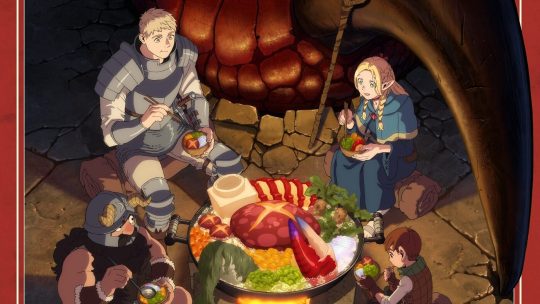
Recently…
Mirke the Meek, amateur podcaster and really nice guy decided to make a podcast about Delicious in Dungeon, the netflix series from Studio Trigger (Gurren Lagann, Kill la Kill). This anime, like many, is based on a wildly successful manga, which Mirke is also into.
He called his project Euphonious in Dungeon and it exists primarily as a call-in show where listeners can share their thoughts on the anime, one episode at a time.
It’s wonderfully short form, like Mirke’s primary self-titled podcast, and features some delightful cooking folly from Mirke’s own kitchen.
Now, while I’m happy to jaw about any show I enjoy, Euphonious requests we focus on the gameable aspects of the series.
Ah, I forgot to mention. Mirke comes out of an excellent community of podcasters producing TTRPG related content. I’ll probably mention them more later but such members include: FreeThrall of Keep Off The Borderlands, Jason of Nerds RPG Variety Cast, Joe of Hindsightless, and Daniel of Bandit’s Keep. (plus many more!)
Central to this community is that they are all in conversation with each other. Allowing the listener to piece together a greater narrative the more shows they consume.
While Mirke is perhaps the most junior member of the group, he should not be overlooked.
Now, to the Gameable Aspects

Some may know that my first best selling title was Joy of Monster Cooking over on the Dungeon Master’s Guild. So eating monsters is hardly a new concept to me. However, in the past I have always considered: “how can I add a monster eating mechanic?” whereas now I consider “how can I build a game about monster eating?”
The differences, I believe, are quite extreme.
Have you (the reader) read Into the Odd? Or Knave? Or Maze Rats? Or Cairn?
One thing these games have in common is that inventory defines character abilities.
You wanna be a fighter? Better get a big sword. You wanna be a wizard? Better stock up on spellbooks.
With this in mind I thought…”what if we had a game in which diet defined character abilities?”
You wanna be a fighter? Better eat a lot of protein. You wanna be a wizard? Better eat foods high in vitamin B12 (yes I had to look up the memory vitamin).
Could I go on? Yes.
Will I? No.
I want to string these into a series of blog posts so next time we’re going to talk about character stats and charts! (wowee)
P.S. I have no doubt others have tried to do this exact design exercise. I would like (for now) to pretend that is not the case. Once I have a system *then* I intend to look over other’s work to compare and contrast. I think this is a useful method when entering your first round of major edits.
12 notes
·
View notes
Note
What are your main inspirations when writing your stories?
Since I've only just sorted out how tags work, this could very well be the first people hear of my writing project. If that is the case, hello there! I don't want to be taken seriously at all, and my work is completely open to the public domain, and to public forum of critique, it's why I'm here. I don't want to be arrogant and say that I get my writing from a set list of places, I'm sure i've subconsciously drawn on a lot of things that have just invaded my brain and stayed there. For this project, my biggest influences have just been the stuff I've been indulging in while writing. A lot of the hallucinatory stuff with the automaton's memories came from Miracle Musical's Hawaii Pt: II, especially when touching on themes of insanity.
Furthermore, a lot of the emotion i'm trying to portray within the automaton comes from Cowboy Beebop, obviously Spike Spiegel in that show, but also the show's governing philosophy of the past in general, lingering on it, and the danger that comes from that. Linking this to that show's influences, the automaton is almost certainly inspired by the "man with no name" type western tropes of a soft-spoken cowboy lawmaker, and i plan to touch on this and gently lampshade it in my next short story.
It's also just been a weird period in my life, so a lot of stuff about psychology and psychoanalysis has been creeping into my vocabulary (you might notice if you read my stories that I rely on the word "subconscious" as a crutch waaaaay too much) which has driven a lot of the analysis within the work of the automaton's inner workings- I plan to explore it with a lot less flowery language as I have been doing in the next part, not because I don't think the flowery language has it's place, it most certainly does, and the automaton viewing his own brain with this verbose poetry is something worth pointing out, but there is still a cold diagnosis to be displayed here, and this won't be the last time I write about the automaton's brain "acting up". I can't lie, I love drama and theatre studies, so expect a lot more allusions to greek tragedies as this goes on- because ultimately, Aristotelian unities aside, the story of the automaton as I tell it is deeply tragic.
My initial prompt with this writing project was a sort of light deconstruction of Garth Ennisean and Alan Moorean anti-heroes; while I love and enjoy stories like the boys, punisher and watchmen, I sometimes get the impression that while trying to build characters that are morally grey and have more than 2 dimensions, writers can sometimes fall into the traps of creating irredeemable monsters that we are still supposed to follow and relate to. Ennis and Moore both handled it very well, but writing has been in an era of people trying to emulate them, and make comics "edgy". So, I wanted to contrast this by creating a character who started out as an archetypal "anti-hero", but who would, over the course of a full story, develop into a genuine person with connections, and not just be someone living for one purpose, in the case of the automaton, his revenge. Expect that sort of theme to carry on.
Finally, most of the idea for the automaton's amnesia started with Disco Elysium. Disco has always been for me a stand-out story, and as well as the intense dystopian worldbuilding, I like to think that a lot of that game's central ideology can be seen bearing it's head in my writing- while my story is still in it's infancy, I am a committed supporter of the ideas Disco is trying to get across, without naming it directly. Disco, Cowboy Bebop and Hawaii Pt: II are all for me stories that I use as influence purely because they focus entirely on the past, and I want my story to generally move towards the direction of the moral being that the past doesn't define us. The automaton doesn't have to be Harvey Moore, but he also doesn't have to reject that person entirely. Life, memories and whatever state of existence we find ourselves in is entirely dependant on what we make of it. There is always room for improvement. Nobody has to stay an anti-hero.
Thank you if you've stayed through my ramblings. I hope if you find my stories you find them as enjoyable to read as I find them to make. I don't particularly mind if you even like them, just the knowledge that someone can see what I enjoy doing and have an opinion is enough to show to me that there's a good reason to keep going.
Regrettably, this answer is longer than my last story. Don't worry, I'm capping my next one at two-thousand words minimum. I've been slacking on length.
3 notes
·
View notes
Text
Major Study Pitch Proposal Research #5: A look into game mechanics.
The one gaming franchise that had always interested me was The Legend of Zelda. Puzzles, dungeons, bosses, and even side quests had always made me feel enamoured with its gameplays.
With this appreciation, I would like to implement a similar set of game mechanics for my game idea as well.
Most recently, I had taken a liking to one of its latest titles, Breath of the Wild (2017). There are many ways you can play this game; you can walk around Hyrule, search for shrines all around the map, piece together puzzles to help revive memories in relation to the storyline, or build support for the main character in searching for the lost deuteragonists to avenge them. All that, or you could just go straight to the main goal of the game and speed run kill the final boss of the game.
That said, one set of game mechanics involved with Breath of the Wild is the idea of 'power-ups', where the main character Link obtains as rewards in saving villages all around Hyrule; Champions from the past inherited their respective powers and, do to their demises, can not utilise their powers. However, the game allows an interesting idea for Link to be bestowed their powers in defeating Calamity Ganon for them. Much like the unique Weapons Link obtains through each different dungeon, it is now instead actual powers that can be used to aid Link in battle. Thus, this new take creates a refreshing experience to Link's journey, which is good for a game long running like the Zelda franchise.

Fig 1.: The Legend of Zelda: Breath of the Wild (2017)
While this is an idea I'm willing to try testing out with my pitch game idea, I do want to be at least original with what power-ups I come up with. So, I want to make my power-ups in relation to the species of my deuteragonists.
To clarify, the supporting characters within my game idea are Ancient Guardians who have passed from various incidents surrounding a disaster that has plummeted the world in-game. However, the time that spans within each of their lifetimes are as of yet to be defined - this idea will likely be fleshed within Semester C, though I do still wish to enable the concept of power-ups within my gameplay plan.

I had already created a design for one of these supporting characters prior to this post, but with the temptation of Breath of the Wild, it has now spurred me on in drawing out a concept for this guy's powerup alongside my main character's.

Once I get more settled into my scheduled planning of tasks later in the last semester, I will draw out the rest of what the Ancient Guardians will look like, as well as what their origins and purpose could entail. For now, this is more of an experiment of the functions I could add to my game idea.
Source:
Nintendo (2017) The Legend of Zelda: Breath of the Wild [Video game]. Available at: https://www.nintendo.com/en-gb/Games/Nintendo-Switch-games/The-Legend-of-Zelda-Breath-of-the-Wild-1173609.html (Accessed: 20 April 2024).
0 notes
Note
what do you think about the white lady? got any cool headcanons about her? she's always come off to me as someone distant and uncaring, but not necessarily cruel
My silliest headcanon is I don't actually think White Lady has arms under the bindings.
The less silly headcanon is that I think the humanoid part of her is just her fruiting body / the part people imagine when they think of "what is a mushroom". This would explain why she basically practices birth control by swaddling 90% of it. It doesn't really slow her down, hence the comment that she's only restrained of her own volition, and I think if she wanted to be anywhere else she could just. submerge and then rupture out of the ground wherever she wanted. That's right. Most stationary seeming character in Hollow Knight has Flowey mobility.
To build from here to like... deeper stuff, my take on WL and her presence in the pantheon is the idea that WL is a sort of literalized "Columbia", or the role Amaterasu takes in the mythology of the founding of Japan. The idea of "The Land" or "The Kingdom" as a living mythic figure that a king is potentially wedded to.
WL seems overwhelmingly passive. She does not exhibit much concern about the kingdom or its downfall. If anything, she seems sort of perturbed or surprised that she misses PK as much as she did. Her response to an uncomfortable feeling is just sitting around and waiting for it to die. Even compared to her husband, she seems like a deeply ancient being. Which makes sense, because it's implicitly her roots that are sticking out at Kingdom's Edge, which would suggest we actually spend the entire game walking over her body. She is the soil of Hallownest. She defines its borders. There are few pockets older than her, mostly Unn, suggesting Greenpath may be- partially- a place that her roots don't reach.
WL basically does nothing with politics until it's mentioning the Grimmchild where she tells it outright to not get any ideas because the land would never accept it as a king, something that "someone who isn't a queen anymore" seemingly wouldn't have any say in. But I think WL sees herself as 'the land', even if she is more of an extremely expansive organism that lives within it and quite possibly maintains symbiosis with it. As far as we can tell, gods project their own sort of habitable spheres in an overwhelmingly barren world; WL may be the sort of underground sun warming the ground, plants growing from the 'exhale' of her root structure.
You're right that I don't think she's necessarily cruel, though she is absolutely callous in some ways. I think a lot of it comes down to her perspective. WL is kind of terminally big picture. Her response to Ghost- a long-lost child she did grieve to some extent- is to politely ask them if they wouldn't mind going to die in place of their sibling, on account of it'd be obviously not preferable if the apocalypse ensued. When Ghost in the 'true' endings (and similarly derived Godmaster endings) attains the void heart, WL equally neutrally accepts that she basically has no control over them anymore. The prospect that they could kill her probably dawns on her, but we know what she thinks about the Radiance. It's just not preferable really.
I feel like WL is significantly more "alien" or "eldritch" than PK. This doesn't necessarily make one of them better than the other, but a lot of PK's dilemmas are actually pretty relatable. The irony of him seeming like such an aloof mysterious god is that once we actually break past all his defenses, he is surprisingly ordinary. Yes, he was some kind of giant sandworm dragon. But his foibles and failings are unglamorous. We practically find him the way you find a failed survivor in a zombie apocalypse, a body huddled in a closet bunker where it held out and failed, still carrying the echo of trying to convince himself it was worth it.
WL's problems are less relatable in that sense. I think most of us don't have the ironclad certainty that unless something goes extremely wrong we'll outlive all of our problems, but that's just it. She's not going to fight her enemies or take a meaningful stance about anything. She can be almost darkly-comically negligent, such as asking "Ogrim" to go check on Dryya when she's able to track the progression of Hollow's infection through her roots from half the kingdom away, and it hasn't occurred to her that Dryya should be eating and sleeping and moving around more. Like a dotty old grandma who forgot to feed the parrot one too many times and wonders why the old thing doesn't sing for her anymore, only a bit more unsettling directly because while many of us might be upset at the fatal neglect of a parrot, many more are justifiably obstinate about the idea someone might see you as just a pet novelty, because your lifespan really isn't that long.
192 notes
·
View notes
Note
Wait, no, actually, tell me about the Scribblenauts timeline. I must be real... I like it too. I love unifying timelines where things seemingly just happen, tell us!
scribblenauts fans rise up >:] to be clear this isn't an attempt to sort out the canon timeline [although if you asked i'd guess unlimited > scribblenauts > super > unmasked based on the few splinters of plot we get] but rather taking inspiration from the scraps of story available to build something new and coherent, although at this stage 'coherent' isn't super accurate lmao it's just islands of solid ideas amidst a sea of autism nonsense
basically i'm deciding that the doppelganger's presence in 10-5 of super counts as a plot and slapping that on top of the more consistently defined world and lore of unlimited and onwards [so kind of what unmasked and the subsequent comic did but batman isn't there], with an added sprinkle of the 'scribblenauts being an actual organisation that maxwell is involved in' thing that never made it past background details in the first game. while unlimited arguably has the most iconic and/or existent plot and for sure i want lily to be a deutragonist i'm not sure how much of it i'll retain because 1. turning your daughter into stone is bad parenting 2. let her tag along and be an actual character instead of a literal rock you cowards and 3. the more super-inspired storyline i have in mind with the doppelganger is probably enough to carry the emotional intensity of a mostly lighthearted story by itself and i don't want to bog things down with too many subplots lol
i'm absolutely reading too deep into this kiddie game but i think the doppelganger as an antagonist of maxwell's own creation reflecting all his worst traits would be super interesting in an environment that puts more consistent and deliberate thought into character writing, so that's the idea i'm basing this autism-powered rehash on. i don't think it's ever actually specified but when i was a little sporelet playing scribblenauts unlimited for the first time i somehow got the impression that starites grant wishes? which is cute so i'm using that as maxwell's motivation to join the scribblenauts and seek them out, that he wants to collect enough to wish for something cool and superficial that a 12ish [?????] year old kid would want. but then after lots of adventures and character development when he's in the dramatic final confrontation with his doppelganger and has matured enough to see him as a distressed kid in uniquely terrifying circumstances rather than just an annoying knockoff he instead uses his wish on giving doppelganger the chance to be a normal kid with a normal life because he wants to make kind decisions now. then i guess they all go home and nobody dies in a scripted ufo explosion
this post is getting toooooo long so i'm gonna try and wrap it up now but god i already have so many ideas rattling around my head for an autism reawakening that could be over in a week lmao. now i'm even sadder that my computer is busted because i want to replay unlimited and refresh my lore so badly..... there's a fandom page [breezewiki sweep though] for the series which has helped refresh my memory but none of the sources are cited it's a nightmare. what do you mean maxwell and lily are twins for the love of god give me a single screenshot or manual scan that mentions this
also i didn't have a good place to insert this but even though edgar and julie having 42 kids is obviously a Silly Joke and excuse to give unlimited some unique characters i am choosing to interpret it as them being experienced foster carers. i don't care to sort through every single character and decide which if any are biologically related to each other lmao but adopted/foster families are swag as hell and there should be more of them in media! it also adds a nice layer to the doppelganger plot - maxwell is more willing to reach out to him because he's seen 'angry bitter kid who will only get better with kindness' in a lot of his brothers and maybe himself, and it gives doppelganger an easy place to go for his happy ending because maxwell's parents are experts at taking in kids like him. didn't want to end this post without mentioning this because i'm already suuuper attached to the concept
#[not] sorry for the long ass scribblenauts infodump i just love the goofy noun kids! it may happen again#just fucking whatever#scribblenauts#yeah i'll tag this why not. see if i can get the 3ish active scribblenauts fans to weigh in on my deranged nonsense#also you know how i mentioned in the tags on my last post that one of my overambitious hyperfixation ideas was a super remake#cause initially my idea was that vanilla 5-10 is the 'normal' ending but if you've collected every starite you get this 'good' ending#i dunno that just seems like the kind of slightly annoying design decision that a late 00s ds game would have made hsnbkjndhfhnjj#i'm so normal about this fucking baby puzzle game. can you tell#long post#at least i think it is. i don't use mobile if i can help it#mysthalery
29 notes
·
View notes
Text
Sonic & Tails R: A Love Letter To Miles Tails Prower’s Characterization
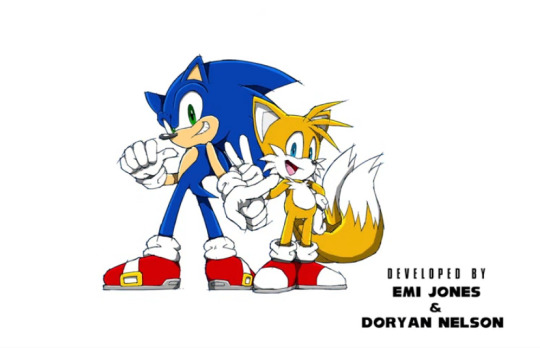
Warning: This will contain massive spoilers for the short radio play series of Sonic & Tails R. If you haven’t listened to the radio play yet on Youtube, I’d highly recommend any hardcore Sonic fan who hasn’t seen it check it out. It’s one Hell of a treat.
For as far back as I can remember in my childhood, Tails’ story of trying to step outta Sonic’s shadow has been such a resonating one for myself. Even when I was a much younger kid playing my Dreamcast, during entries like Sonic Adventure 1 & 2, there was some idea lingering about why Tails just stood out more emotionally in his journey to grow beyond depending on Sonic all the time for help. Now here I am a young adult in my late twenties having such a deeper appreciation of this little two tailed genius kiddo because he’s got an important element that’s made him so beloved for good reason.
In spite of his genius being a rival to that of Eggman’s high IQ and of course proving to surpass it plenty of times when scenarios boil down to being a high stakes battle, Miles Tails Prower beneath it all is still just like any one of us. We’re all trying to find our place in this world about what defines us for who we are as unique people. He wants to be more than just seen as someone who’s alongside Sonic The Hedgehog’s never say die attitude, but prove he’s plenty capable of standing on his own two feet to protect everything the kid holds dear to himself. Underdog stories, when they’re naturally executed very well, can reel me in so easily. They are very much my bread & butter trope I adore seeing.
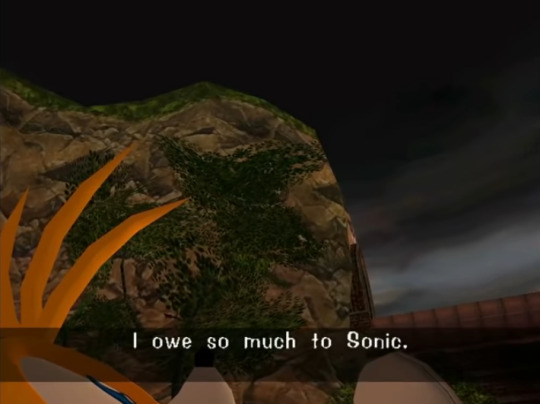
To no one’s surprise, the two Sonic Adventure’s iterations portrayal of Tails’ characterization are hands down some of my favorite writing for the two tailed fox, regarding what the 3D era has done toward him, development wise. It gave him more of an existential struggle to endure like, “What happens when Sonic isn’t around to help stop Eggman? What if I’m not strong enough to accomplish what he can?”, making Tails plight to be seen as an equal all the more endearing when stopping Eggman in his climatic battle against the Egg Walker in Station Square. This here is a great use of a timeless lesson you can apply in life that if you set you heart and mind on anything, there isn’t a thing you can’t accomplish on your own, which is why many fell in love with Sonic Adventure 1 & 2′s writing for Miles Tails Prower’s journey of independence.
As someone who comes from a large family tree of relatives, I feel the weight of my existence on my shoulders at a number of points more than I’d care to count, admittedly. Seeing Tails struggle with his sense of purpose, in contrast to observing how much Sonic has accomplished with his carefree, yet deeply compassionate attitude, means the world to me in watching another trying to comprehend their value as a whole on how much they matter, overall. This is a big part of why my fondness for SA1 & 2′s quality has never wavered over these years, besides still obviously enjoying most of their game play mechanics. People can try to debate to their heart’s content on whether the Adventure games still hold up in their own eyes, but I’ll always respect them for how they tried to develop certain characters, such as Tails, Gamma, and Shadow The Hedgehog notably, to attempt expanding upon their characters, as well as world building.
I won’t bother going into a rant about how Sonic’s recent 3D games have butchered Tails’ personality & relatable nature, due to the current writers in charge of handling the cast of characters. More or less, I greatly empathize toward the notion many have already stated about Tails being so cowardly and God forbid, looking at Lost World, downright severely mean spirited. Rather, I’m obviously writing this lengthy post to breakdown why Sonic & Tails R succeeds, where these certain 3D games have greatly faltered in exploring Tails’ emotional dilemmas as an insecure, yet still having the courage to prove himself, talented boy full of hidden potential he doesn’t quite realize, until his back is against the wall in life threatening situations.
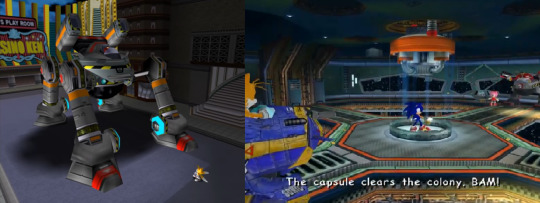
“That day, I realized I couldn’t depend on you forever. Not that I can’t depend on you, but like, “What happens when Sonic isn’t here?”, you know?”
Sonic & Tails R further delves into this fundamental rule of what has defined Tails in Sonic Adventure 1 & 2′s stories of events where Sonic wasn’t there to aid his best bud in taking down Eggman’s evil efforts for global domination, most importantly his fear of defending the Earth without his role model. Besides what I already stated in SA1′s events in Station where he stopped the Egg Walker, as well as the missile Eggman launched from detonating before their climatic battle, Tails watched Sonic blow up in ARK’s capsule presuming him to be dead after Sonic imparted how much faith he has in the kid’s abilities to be truly strong in the face of any foe. Sonic & Tails R manages to use fan service in a way that doesn’t feel like “pandering” for the sake of it, using this past canon material to do more of an in-depth study about Miles’ anxieties of existing without Sonic.
Wouldn’t put it past them if EmuEmi & crew were using SA2′s Sonic death fake out scene in that space capsule to further add trauma to Tails’ psychological attachment to Sonic, as well as his insecurities of depending on him too much, to boot. While it’s never obviously outright stated in their radio play, I definitely believe they were factoring this element into adding dramatic exploration for why Tails is so self-conscious about the worst case scenario of permanently losing Sonic. Watching Sonic supposedly die put Tails into a deeper state of self-reflection, so I very much enjoyed how they went using these past events to create a thorough exploration about him learning just as it’s important to realize you need to stand up for yourself without using someone else as a crutch all the time, it’s doubly important to remember there’s nothing wrong about asking someone for help when you’re about to be down and out with little options left.
Sonic & Tails R beautifully builds upon the foundation these two games’ stories left behind years ago, creating new damn great material to explore with the most iconic characters of this cast, Sonic & Tails brotherly dynamic. I’ve been praising Sonic & Tails R out the wazoo for how well it captured Tails underdog story of overcoming death defying odds, but it managed to remind me how simply adorable and outright wonderfully endearing their brotherly chemistry is as a whole. This is a big friendly reminder Sonic isn’t all about being cocky wise cracking character making meta jokes left and right, but he can be plenty capable of showing serious compassion to anyone he values as an ally and friend. This is no greater evident, than with him verbally lifting Tails up in his time of need when he’s self-depreciating his own significance. It can be seen in Episodes 2, 4, and 7 giving Tails motivational pieces of advice.
Episode 2 In Adabat’s Cavern
-Sonic: Wasn’t it your radar that helped us find these Emerald shards in the first place? How could you be slowing us down when you’ve gotten us this far?
-Tails: But, I...
-Sonic: I could never make something like that. You’re the smartest person I know, Tails. One way or another, we’ll figure this out, count on it.
Episode 4 In Holoska After Helping Silver Save The Chao
-Sonic: So, what was that back there? At the cave, in Adabat? -Tails: What do you mean? -Sonic: Frozen stiff. Confidence shot. It’s not like you. It was more than feeling like you were “slowing us down”, right?
Episode 7 Inside The Egg Carrier 3
-Sonic: Let’s split up! I’ll distract them and you can go after the energy source. -Tails: You’re gonna take them on all by yourself!? Let me help, Sonic! -Sonic: No time for this, Tails. Stop overthinking and just go! If I can get their attention, I’ll take the heat off of you and that room you’re going to probably won’t have any security. Take this emerald and I’ll take the other one we have. It’ll lead me right to you after I beat these guys. -Tails: O-Okay... -Sonic: Hold on, Tails! Listen to me. Don’t stop moving and be careful. I’ll be fine and so will you!
Sonic & Tails R remembers the most crucial detail of their important relationship. One isn’t better than the other and needing to always rely upon that notion for helping one outta a jam, but instead showcases how they’re equals as a team/bros. Sonic may be super fast and strong, however Tails has his intelligence to analyze situations in a different angle Sonic wouldn’t necessarily consider, per say. Which isn’t to say Tails couldn’t put up a fight either, as we’ve seen in SA1 & SA2′s stories where he faced Eggman one on one with no outside help to best him at his own game of wits & strength.
We get see the apex of this idea through Tails facing Eggman in his super improved mecha walker. Although Tails may get thrown for a loop here at first by Eggman, it’s his villainous speech about winners and losers in their world that ironically does the exact opposite of what he intended. Eggman wanted to crush Tails’ sense of self worth before finishing him off, but all it did was reignite the very lesson Sonic told him earlier before running to distract Eggman’s robotic minions. That said lesson of he’s more than capable of facing dangerous threats
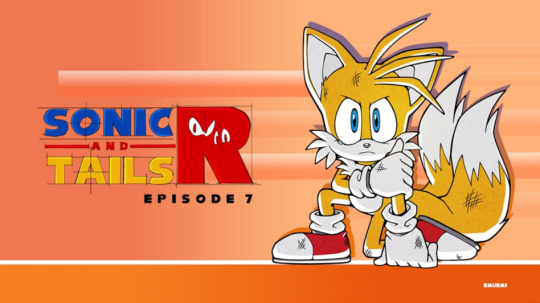
-Eggman: Poor boy. We all have to learn this lesson, sooner or later. In every game there’s no one you can depend on. You’re all alone and you’re either a winner, or a loser. And as you know, loser’s lose all of their lives. Say goodbye, fox!
-Tails: You’re wrong! I can depend Sonic! I won’t let him down! I can’t because...Because he’s depending on me! And because of that I won’t lose to you!
This radio play strikes a good balance in utilizing the grey moral area about depending on someone vs it being an unhealthy display of attachment derived from serious insecurity. Word’s can’t begin to describe how much I loved this moment to pieces because it’s oh so important for writing Tails’ characterization. If you’re going to tackle him being super self conscious about his reliance on Sonic, then you gotta remember why they are so close to one another to begin with. Sonic & Tails have an unbreakable connection, considering they’ve brought out their best qualities in themselves from being together as individuals. For Sonic, it’s his older brother compassion to Tails to bring him outta feeling melancholy. For Tails, the kid finally understands there isn’t anything wrong with depending on Sonic when he needs it most.
After all, that’s what a real healthy friendship is all about. Whether you’re giving someone a dose of tough love, or simply a piece of motivational advice, it defines how much you truly care about someone, period. Sonic & Tails have this very same power from their bond, which is why new emeralds form from their compassionate friendship that hasn’t been shaken after all the years they’ve been together. Another detail worth noting is it adds to the lore in an impactful manner when Tikal expresses in Episode 8 about positive connections and thoughts from users of the Chaos Emeralds having a strong will & heart. Using the ideas they had for encapsulating Sonic & Tails’ dynamic to create new emeralds from their love for each other as brothers adds an emotional weight.
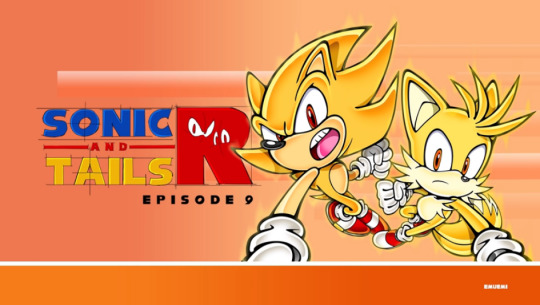
“So, Sonic’s not the only one who harness the power of the Chaos Emeralds? I can too!?”
“Yes, you have a strong heart! There is a power waiting to be unlocked within you, as well.”
I’d always daydreamed about in my childhood seeing Super Sonic & Tails take down a threatening villain, whether it was Eggman or different powerful creature such as Chaos or the Biolizard. You can imagine how fucking giddy I was beyond belief to see this artwork of Episode 9′s cover for the radio play. Tails not only got to have another one on one with Eggman, but a team up with Super Sonic in his own respective Super form? Sign me the Hell up! Talk about an all you eat buffet of good writing for Tails’ journey reaching its climax. Getting to hear this play out, alongside the amazing song of Fly With Me, made it authentically feel like something straight outta if there were an installment of Sonic Adventure 3 being brought into reality, which certainly feels like it now.
Episode 9 has so much awesome stuff with Sonic & Tails working together in their super forms. Particularly, my favorite scene is at the beginning when Sonic teaches Tails how to navigate his newly acquired speed in his respective Super form. My heart melted hearing Sonic help Tails through it all, while he was overjoyed about how fun this new form is for himself. Wholesome Sonic & Tails content is the perfect daily serotonin for me, easily. It’s an awesome fun fact to know they used a scrapped boss from Tails Tornado segment in SA1 for Eggman’s flying dragon three headed robot in their big final battle, once again using old canon material in a very effective manner to boost the quality of their fan made story.
It’s been a real thrill to hear Mike Pollock play a straight forward serious Eggman making my day in more ways than one, considering that’s another thing I’ve been yearning for desperately besides Tails being a competent character again. His performance in Episode 9 when Eggman gave that speech about how long he’s been at odds with Sonic & Tails stubborn will power was simply excellent. The moment he told his mechanical dragon to crush them I got serious chills. That’s the Eggman I remember and grew up with. He could be a hammy villain sure, but Eggman wasn’t a doormat that could be swiftly beaten. Robotnik can be considered a serious threat in his own right and this radio play nailed it down to the very letter with how much he predicted their actions.
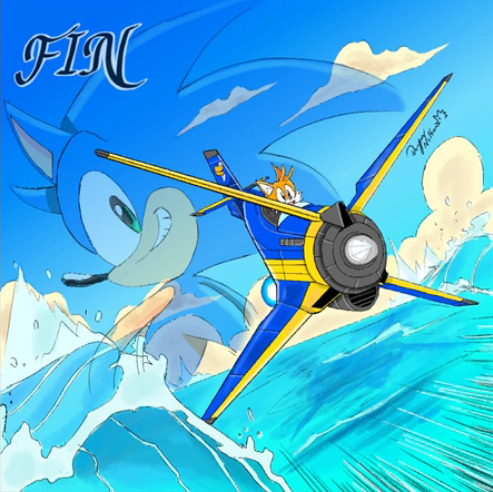
“Sonic, all I ever wanted to do was be like you. You’re not scared of anyone or anything. I could never be like that. At least, so I thought. I grew from that, but then I got so caught up in trying to prove it that thought it wasn’t okay to depend upon anyone, especially you. I just didn’t want to be that scared little kid in Station Square anymore, but now I understand. It’s okay to depend on your friends. It all means is that we’re stronger together, so the next time Eggman comes back and wants to start any trouble with you, or any of my friends. Emeralds or no emeralds, he’s gonna have to get past me and he won’t!”
Sonic By Episode 1′s End: Aww, yeah! Adventure, here we come!
Tails By Episode 10′s End: Aww, yeah! Adventure, here I come!
Turn your thoughts into power. Be all that you can be.
The ending legit got me choked up because what of they decided to do for wrapping up Tails journey in a poetic fashion. Having Tails go off on his own separate journey to grow more independence pulled on my heart strings perfectly. Very much so, as I’m transitioning slowly, but surely, into gaining more freedom to go out into the outside world in my own life. Concluding the story, by Sonic & Tails holding onto the two Emeralds their bond had formed from positive energy, due to their powerful friendship, was so heartwarming. This is how you write an overview of what makes Sonic & Tails chemistry work so well as it does.
Sonic & Tails R’s ending represents while some things never change, like Sonic and Tails bond for each other, it also shows there’s very much a necessity for people to grow, hence Tails’ whole solo journey in the epilogue. People can’t stay in the same place forever and will need go about finding their own path, even if it means saying “goodbye” periodically for a notable amount of time.
It’s for these reasons I’ve listed in great explanation above throughout this detailed post cement Sonic & Tails R high on my list of favorite Sonic fan projects. They captured the magic of what made the Adventure games so beloved. Gonna be looking back on this passion project for many years to come. Everyone involved in this year long effort of a project dating all the way back Summer of 2020 ought to be immensely proud for how much their hard efforts paid off in the long run.
Thanks for taking the time to read my thoughts here!
Hope you enjoyed.
#sonic and tails r#emuemi#sonic the hedgehog#miles tails prower#sonic analysis#long post#dr eggman#sonic adventure#sonic adventure 2#this fan project means so much to me#everyone poured their heart and soul into it
63 notes
·
View notes
Text
Tangled Salt Marathon - “Rapunzel Knows Best!” ( A first half of S3 Recap)
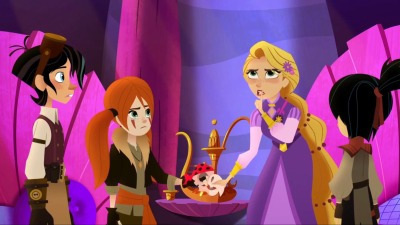
So I decided to place the recap after Be Very Afraid for several reasons. For starters it’s where the season three hiatus took place. It’s also framed like a cliffhanger episode the same as The Great Tree and Queen for a Day; so while Cassandra’s Revenge is technically the midseason finale, Be Very Afraid functionally servers this narrative purpose better. Finally I want to keep the Cassandra heavy stuff contained in it’s own recap later same as I did for Varian’s arc in season one.
Also keep in mind, everything I discussed in previous recaps still apply here. Nothings changed and you could argue that the issues I bring up now could have also apply to past seasons; they just happen to be at their worst here.
Here are the past recaps
To Filler or Not to Filler
Hey, What Ever Happened to That Varitas, Guy?
What Is the Point?
‘Whatta Twist’
And here are the episodes that’s covered in this recap
Rapunzel’s Return Part 1
Rapunzel’s Return Part 2
Return of the King
Who’s Afraid of the Big Bad Wolf
The Lost Treasure of Herz Der Sonne
No Time Like the Past
Beginnings
The King and Queen of Hearts
Day of the Animals
Be Very Afraid
Poorly Defined Conflicts

I’m not just talking about Cassandra’s lack of goals here either, though that is a part of it. I mean in several episodes the central conflict isn’t laid out clearly enough before being resolved. We flip from one set up to the next without ever resolving the first; like in Rapunzel’s Return when Cass and Varian fight for screen time or whenever Rapunzel is suppose to learn one lesson only for someone else to learn a completely different lesson in every other episode. And to this day I don’t know what Rapunzel and Feldspar’s subplot in Lost Treasure was suppose to be about.
There’s also of course the ill-defined overall conflict; which at this point has become convoluted and nonsensical to the extreme, and will only grow more aggravatingly stupid as the season progresses. The main villains lack clear goals, their motivations don’t align with previously stated facts, and the actual interesting conflict involving the threat of the rocks and their destruction of people’s lives and homes is just shoved under the rug and forgotten about.
There is no story without conflict. Having the conflict be all over the place is not only confusing but makes it harder for the audience to invest in what’s going on.
Failed Narrative Promises
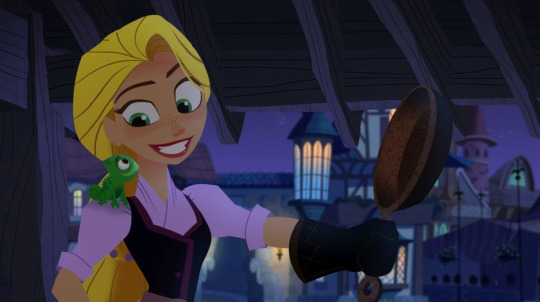
Tying in with the above statement regarding conflicts, we have failed narrative promises. Rapunzel is repeatedly told to that she needs to learn something in several episodes only for her not to learn it at all. She either learns some unrelated ‘lesson’ that wasn’t established, (like in Rapunzel’s Return with her pervious goal about ‘opening up to others’ being switched out for a generic ‘responsibility’ lesson that at the last minute, where she doesn’t even do anything responsible,) or she winds up ‘teaching’ the opposite lesson to a different character thereby rewarding her for her bad behavior.
And that’s just within the induvial episodes themselves; there’s also broken narrative promises through out the overall story arc; like...
no justice/redemption for Lady Caine,
no acknowledgment that the Saporians are the victims of colonization
no conclusion regarding Corona’s murky past
no satisfying ending to Varian’s plot that sees everyone in involve grow
a poor copout of an explanation for Cassandra’s face/heel turn
The Dark Prince reveal going nowhere
The Brotherhood being put on a bus
King Frederic, or any royal, not being held accountable for their past actions
Lance’s new found responsibilities just being thrown away for the tenth time
The Disciples plot being being dropped
next to nothing in season two winds up being relevant
And Rapunzel, the protagonist of a coming of age story, fails to learn anything at all
I could probably go on but you get the gist. Tangled is incredibly frustrating show to watch because doesn’t deliver what it promises. You’re not being clever by ‘subverting audiences expectations’ unless you can justify your narrative decisions with previous set up. Tangled is too lazy to build proper set ups so it’s ‘twists’ leave you wanting to punch things rather then impressing you.
Character Assassinations

Every single character in Tangled the Series gets thrown under a bus, driven off a cliff, and then allowed to drown in the ocean of their completely unaware self-congratulatory smugness.
Rapunzel is turned into a bully
Cassandra is given the idiot ball to hold permanently
The King and Queen are lobotomized
Quinin gets replaced by a robot
The rest of the Brotherhood are pale shadows of what they could have been
Edmund is transformed from tragic complex figure into a dumb jerkoff who abuses his kid for a laugh
Zhan Tiri, once an ancient demon warlock, is reduced to a floating impotent ghost girl
The Saporians become poor hipster parodies
Cap is put on a bus
Any villain who isn’t Cass is gets ignored
Lance is infantilized to the point of absurdity
Eugene becomes a doormat
and poor Varian is forced to become a complacent victim to his abusers as oppose to being allowed to keeping his dignity
I think the only person who escapes this mass murder of characterization is freaking Calliope, and she’s hasn’t even appeared yet! (Well okay her and Trevor, maybe)
This all ties back into the poorly defined conflict and failed narrative promises. Rather than let the characters drive the story, they’ve become puppets to the plot, and plot is really stupid and forced, and circles back in on itself and is full of contradictions.
Manipulating the Audience’s Empathy to Do the Work for the Writers
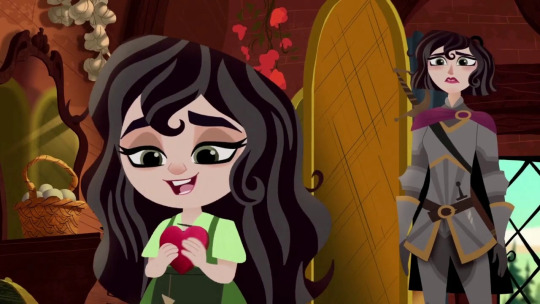
The reason why the creators believe they can get away with such poor characterization and lazy writing is because they expect the audience to do all the heavy lifting for them.
Cass isn’t given an on screen reason for what she does because they’re hoping her fans will just automatically excuse her because they like her/relate to her and not, you know, get mad at the writers for dumbing her down. And after all who doesn’t love the creator’s pet? Meanies! That’s who!
No one calls out Rapunzel’s bullshit on screen, because if everyone likes her, then you, viewing audience, should too. Because if you have any sort of independent critical thinking abilities and a sense of right and wrong then clearly you’re ‘just a hater’.
Everyone should just shut up and be satisfied that Varian is even on screen now and be grateful for the scraps that they get cause he’s not the real point of the show and according to Chris ‘Varian fans aren’t real fans’. Even though they make up most of his viewing audience.
I could go on, but it’s just variations of the above. The writing in this series is very fond of gaslighting the audience and trying to trick them into justifying the absolute worst behaviors while desperately hoping they doesn’t noticed the continued downgrading and dismissal of characters they do like or once liked.
And the sad thing is, it’s worked. There are people to this day that still try to justify this show’s shitty morals and bend over backwards to excuse the likes of Rapunzel, Frederic, Cassandra, and Edmund. Worst, there are loud sections of the fandom, (usually on twitter) who think bullying is okay and follow in Chris and his characters footsteps. Most of them young impressionable girls who are now ripe for TREFS to indoctrinate because they use the same bullying tactics and excuses for authoritarianism.
Media does effect reality, but not in the way purists and antis would have you believe. No one is going to become a violent manic from playing a video game nor a sex offender because they read a smut fic. But they very much will conform to toxic beliefs if it’s repeated enough at them by authorities they ‘trust’; like say the world wide leading company known for family entertainment and children’s media, and the ‘friends’ they find within the fandom for said company...
I’m not saying you can’t enjoy Tangled the series or that you’re some how wrong for liking it’s characters, nor do you have to engage with every or any criticism thrown it’s way. But yes you need to think about the media you consume on some level and valid criticism is very much important to the fandom experience for precisely the above reasons.
Conclusion
This isn’t even the tip of the iceberg of what’s wrong with this show, but it is most of its biggest problems laid bare. Anything that haven’t covered here or in the past recaps will be explored in the final recap. Cause this is it folks; the last leg of the journey for this retrospective. When come back, hopefully next week, we’ll tackle Pascal’s Dragon.
99 notes
·
View notes
Text
Max Goodwin and Randall Pearson: The Well-Meaning, Incredibly Self-Centered Leading Men We’ve Grown to Love.
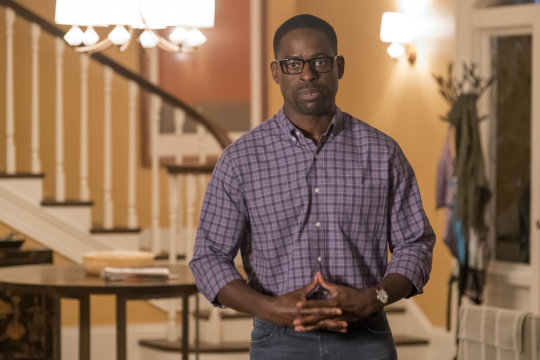

Hey fam! Like I said, I’ve been writing a ton of meta lately and this is another one that’s just been sitting in my drafts. It’s basically a This Is Us and a New Amsterdam meta which is something I haven’t done before but something I want do more of. In my Game of Thrones days I used to write a lot of meta about shows and characters that had similarities so this is fun for me. I hope y’all enjoy this. ALSO THIS HAS SPOILERS FOR BOTH SHOWS!!!!!!!
Without a doubt the two most popular shows on NBC is This is Us and New Amsterdam. And what’s not to love? They’re both emotionally driven, heartfelt, shows that focus on incredibly deep and complex topics. Though one show focuses on family dynamics and the other focuses on the healthcare system, these shows are very similar in more ways than one. Case in point, Max Goodwin and Randall Pearson. The more I watch these two shows, the more I realize how these two characters are so alike!!! These two men are kind-hearted, well intentioned, individuals who genuinely want to make some sort of positive difference. They are incredibly ambitious and always have “bright ideas” and “goals” they want to accomplish and somehow they’re able to meet those goals without ever having to sacrifice their wants and needs. By every definition these men are the “main characters” or the ultimate “protagonists.” These are the folks that we are supposed to root for. At the same time, though these men have many traits to be admired, when you truly look at it both of them can be incredibly self centered and selfish especially when it pertains to their romantic partners and love interests. No matter how appealing you make these characters out to be these men clearly fall under the Behind Every Great Man trope.
The Behind Every Great Man trope has been used countless of times throughout Cinema and TV History that I’m sure that I don’t even have to explain it to you but for the sake of this meta this is how it’s defined.
“Behind Every Great Man...stands an even greater woman! Or in about a hundred variations is a Stock Phrase referring to how people rarely achieve greatness without support structures that go generally unappreciated, and said support structure is a traditionally female role via being the wife, mother, or sometimes another relation. This trope is specifically about a man who is credited with something important, but owes much of his success to the woman in his life.”
This trope usually has a negative connotation (and rightfully so) because the man who often benefits from this is an asshole and unworthy of this type of support!
For example:
Oliva and Fitz
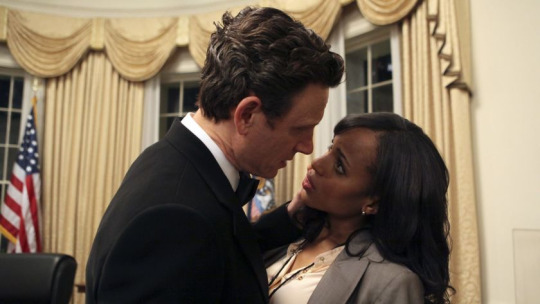
Cristina Yang and Burke
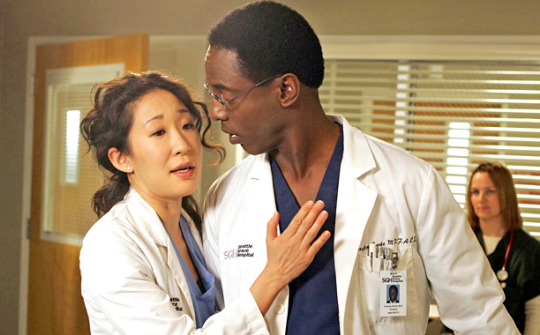
Cookie and Lucious
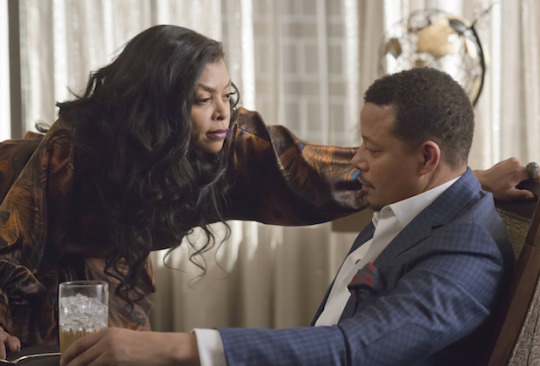
Ghost and Tasha
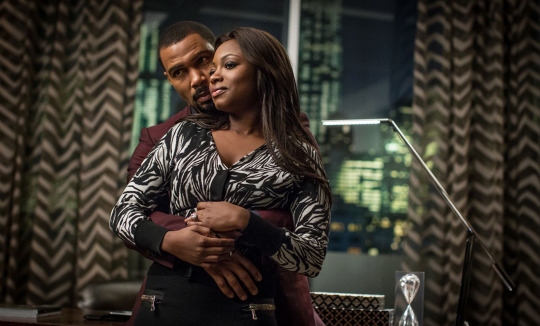
There are countless others but these are a few of the couples that come to mind for me. Randall and Max aren’t comparable to any of these men that are listed above but they are still operating under the same trope. It just looks nicer because Max and Randall are inherently good and inspirational. They are the heroes of the story. I would even argue and say that both men fall under the Chronic Hero Syndrome trope which is defined as
“Chronic Hero Syndrome is an "affliction" of cleaner heroes where for them, every wrong within earshot must be righted, and everyone in need must be helped, preferably by Our Hero themself. While certainly admirable, this may have a few negative side-effects on the hero and those around them. Such heroes could wear themselves out in their attempts to help everyone or become distraught and blame themselves for the one time that they're unable to save the day. Spending so much time and effort saving everyone else can also put a strain on the hero's personal or dating life.”
Just because Max and Randall have these incredibly inspiring aspirations, is it fair that their wives and love interests are always expected to rise to the occasion and support them. Is it ok for their partners to continuously sacrifice their wants and needs because they love these men?
Let’s dive into it.
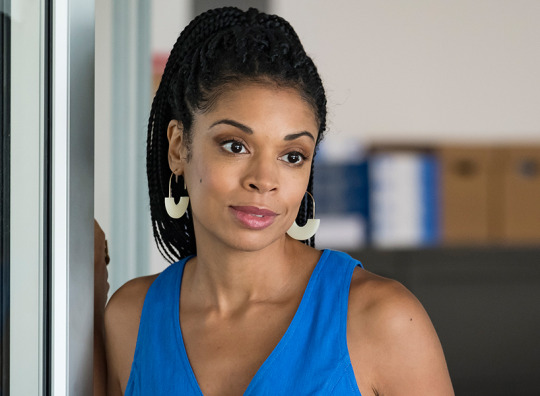
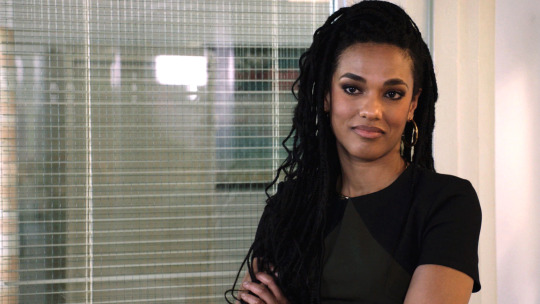
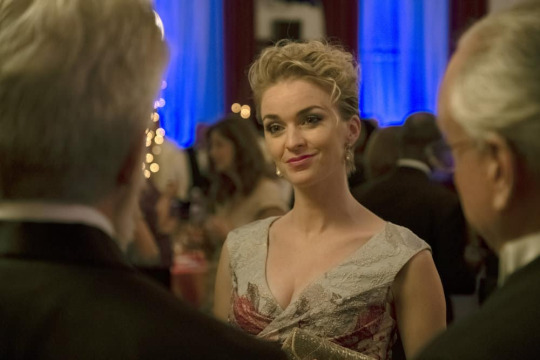
Truth be told, Beth Pearson, Helen Sharpe and Georgia Goodwin had to endure a GREAT DEAL to emotionally support the dreams and aspirations of these men while sacrificing so much of themselves in the process. In media we often see women sacrificing so much of their wants and needs out of love for these male leads and rarely do men do the same thing for their romantic partners and love interests. All three of these women clearly fall under the Act of True Love trope defined as
“The Act of True Love proves beyond doubt that you are ready to put your loved one's interests before your own, that you are truly loyal and devoted to them. Usually this involves a sacrifice on your part, at the very least a considerable effort and/or a great risk. The action must be motivated, not by morals or principle or expectation of future reward, but by sheer personal affection.When your beloved is in dire need of your help, or in great danger, and you do something, at great expense to yourself, for the sake of their safety, their welfare, or their happiness, thus proving beyond any doubt that you put their interest ahead of yours.”
Over the past few seasons we have seen all three of these women truly live up to this trope without any true consequences or accountability from the men they’re making all these sacrifices for. For example, in Beth and Randall’s marriage, how many times did Randall spring an idea on Beth without truly talking to her or considering her wants first? Everyone thinks these two are an ideal couple but she has endured A LOT for Randall.
Randall has spontaneously quit his job, moved his dying biological dad into their home, bought his biological dad’s old apartment building, fostered and adopted a child and also ran for city councilman outside of his district. In all of these decisions, Randall “consulted” Beth about it but at the same time didn’t really consult her. In a way there has always been this expectation of Beth to just go along for the ride with what Randall wants. Is anyone else exhausted from reading that list?! That’s a lot for partner to endure and lovingly support. But Beth has endured and has been Randall’s rock through it all!!! What worries me is that the one time Beth spoke out about her wants and needs of pursuing dance again, he couldn’t match the same energy she was giving him and eventually it led to world war three between them. Though things are looking up in their relationship and he’s starting to support her more, has Randall nearly given to Beth as much as she’s given to him? Absolutely not!
Similar to Randall, Max also had a wife who was a dancer. in fact, she was a prima ballerina. Unlike Randall and Beth, Max relationship with Georgia was rocky from the start. When we were first introduced to them Max and Georgia were separated and rightfully so. Georgia was never Max’s first priority. The hospital always came first in their relationship. He couldn’t even dedicate a full night to her for their proposal. In order to “save” their marriage they decide to have a baby and they both committed to taking a step back in their careers in order to do so. The problem was Max didn’t keep his side of their commitment and took a job to become the medical director at the biggest public hospital in the U.S. She gave up her career to start a family and he totally and completely betrayed her trust. So throughout season one we see them trying to rebuild their marriage but even in the midst of trying to rebuild a marriage based on trust and mutual respect Max still keeps things from Georgia. For several episodes he didn’t tell her that he had advance stages of throat cancer. He only told her when Georgia asked him to move back home. That’s fucked up! Then throughout their pregnancy he was never fully there for Georgia because he was either to preoccupied with the hospital or himself. At the end of it all, Georgia died tragically at the beginning of season two and really had nothing to show for it in her relationship with Max other than her daughter Luna.
Now let’s bring Helen Sharpe into the fold. While all of this stuff was going on with Max and his wife in season one, Max was developing a deep friendship, borderline emotional affair with Helen. Their relationship started out with Helen being his oncologist. As the new Medical Director of New Amsterdam, he swore Helen to secrecy about his diagnosis so that he could still run the hospital. Through that secrecy they eventually formed a deep bond but as his cancer got worse his secret was let out of the bag. He realistically needed someone to step up and run the hospital when he was going through chemo and though Helen already had commitments she stepped up and became his deputy medical director. Somewhere along the lines Max and Helen started developing feelings for each other. As Helen becomes aware of those feelings, she made a choice and decides to remove herself as Max’s doctor. He BITCHES about it but eventually accepts the boundary she’s clearly trying to set. Mind you, as this is unfolding, like Max, Helen is also in a new relationship with her boyfriend Panthaki. As Max’s cancer seems to be getting worse with his new doctor, she goes back on her boundary and decides to be his doctor again. This pisses her boyfriend off because he could already peep the vibe between them and he breaks up with her. When we get into season two, Max’s wife died and Helen set him up in a clinical trail (with a doctor she previously fired) that’s helping his cancer. Unbeknownst to Max, this doctor ends up holding his life saving treatment plan over Helen’s head and in order for his treatment to continue she gives this doctor half of her department!
Helen has sacrificed a lot for Max and now in season three she’s finally prioritizing her current wants and needs first! Like Randall, Max is starting to turn a page and is starting to support Helen and truly listen to the wants and needs that she has. All of this is good but my question is did any of these women have to sacrifice so much for the men in their lives to get a clue?
Why is it that this is a trope we see in media time and time and time again? Even if these men are good, why don’t we still keep these male characters accountable when they put their significant others in these situations that are clearly not fair? I’ve watched countless tv shows and I’ve seen a lot of tv couples but I think I have only come across one couple where the male counterpart has selflessly loved his significant other and has always put her needs above his own.
That character my friend is none other than PACEY WITTER
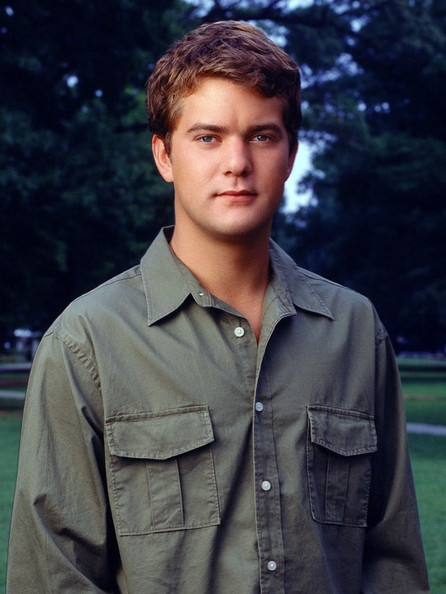
I might be mistaken but I think Joey and Pacey are the most popular ship in tv history and honestly, rightfully so! This is only example I can think of where the male in the relationship so willingly puts the wants and needs of his partner first. It is a completely selfless and sacrificial love. He never wants to hold her back and he never asks her to compromise her wants or needs for him. That’s why I think so many women love Pacey because in a sea of TV relationships, Pacey Witter is a fucking unicorn.
So to wrap this up does this mean that I hate Randall Pearson or Max Goodwin? No! I adore them. I love both of their characters so much. I just think that when we see the media continuously play out the sacrificial wife/love interest for the sake of their male counterparts, it should be called out. I’m all about sacrificial and selfless love but it should come from both sides.❤️❤️❤️
Anyway I hope y’all enjoy this! As always my DMs are opening here or on Twitter @oyindaodewale
#new amsterdam#sharpwin#This Is US#max goodwin#helen sharpe#randall pearson#beth pearson#georgia goodwin#pacey witter#joey x pacey#new amsterdam meta
90 notes
·
View notes
Text
Patton and Monty at War: Unbelieving the unbearable rivalry.
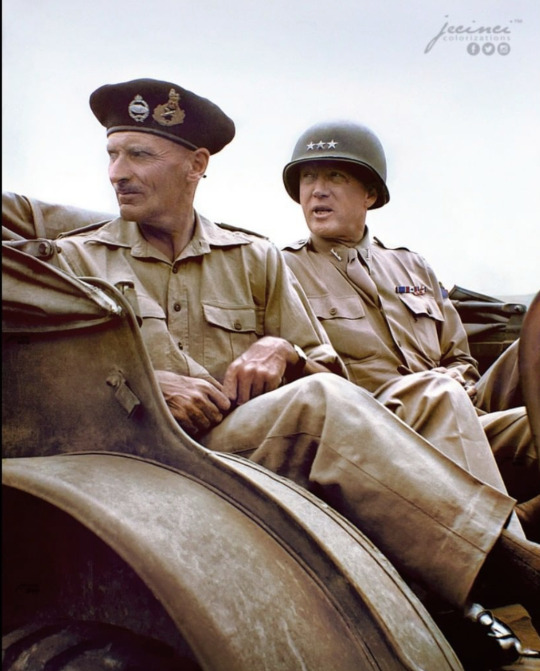
Monty is trying to steal the show and with the assistance of Divine Destiny [Eisenhower] he may do so.
- General George S. Patton, on the Sicily Campaign, private diaries 16 July 1943
So every week I play my usual game of chess over a glass of wine with one of my neighbours in my Parisian apartment building. He’s a retired army general but remains active as a military historian and speaker. He’s curmudgeonly but one warms to him quickly as he doesn’t suffer fools gladly. He’s not a fan of women in the military but reluctantly concedes he would make an exception for me (besides who else could he play chess with?). We get on really well now because of the Covid lockdown this past year. We often have long discussions about military history and current politics until the bottle of wine is completely drained.
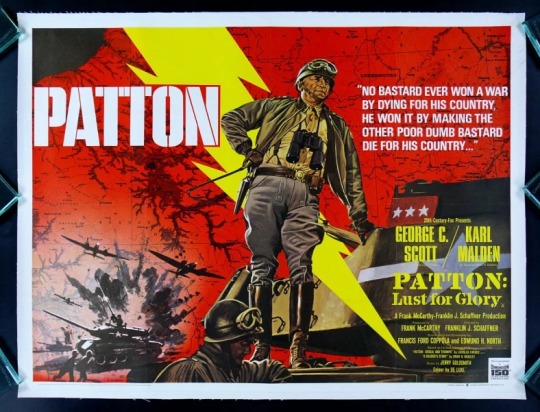
On one occasion he invited me to watch the 1969 classic war film, Patton, about the life of one of America’s greatest iconic World War Two generals, George S. Patton. It’s been years since I’ve seen it and I almost had forgotten how great the movie is with George C. Scott as Patton and Karl Malden as General Omar Bradley. We watched it in English and then discussed many things that came out of the film.
Hollywood and history usually do not mix. It is quite common for filmmakers to take a historical subject and to distort it for their purposes and to dumb it down for entertainment purposes. In the case of the movie, Patton, there was no real attempt to distort the story of Patton. It was a fantastic and stirring Hollywood movie. Moreover it was an excellent study in character given Oscar worthy heft by the great George C. Scott as the crusty General George S. Patton. Francis Ford Coppola’s script was severely under-rated.
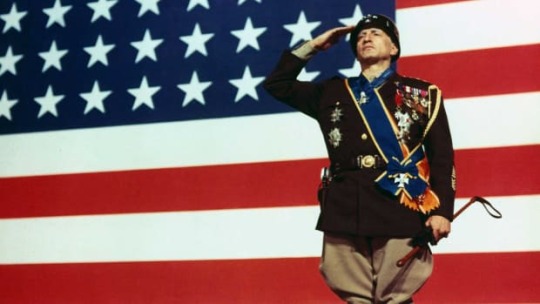
However there remain glaring inaccuracies such as Patton’s opening speech in the movie - admittedly a an iconic bit of cinema - but even this was based on his statements and captured the character of the man, something even acknowledged by the Generals’ family.
Much of the details of his role in the defeat of Germany are true. The only real omission was the lack of focus on Patton’s Lorraine Campaign, where he distinguished himself. There are some exaggerations in the movie and some minor distortions such as in the weather-prayer scene. In general, the movie managed to produce a great overview portrayal of the character and career of an extraordinary American leader.
The film does accurately relate the leading role played by Patton in the liberation of Sicily. His daring use of armour was crucial in the defeat of the German army on the island.
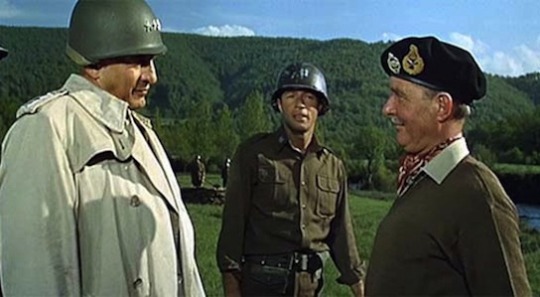
However long after the film had ended I did think about one thing that irked me. And this was how the movie seemed to linger on the belief Patton was motivated by the desire to do better than General Montgomery, the victor at El Alamein. Indeed the film probably reinforced the accepted conventional wisdom that these two driven and ambitious men hated each other.
There was a great personal rivalry between the two men. They were both driven and wildly ambitious. The movie suggests that the rivalry between Montgomery and Patton was the main feature of the Sicilian Allied campaign and was perhaps a factor in why it ended so quickly with a decisive Allied victory.
The rivalry was not as intense as the motion picture suggests and the two men worked together when needed for the good of the Allied cause.
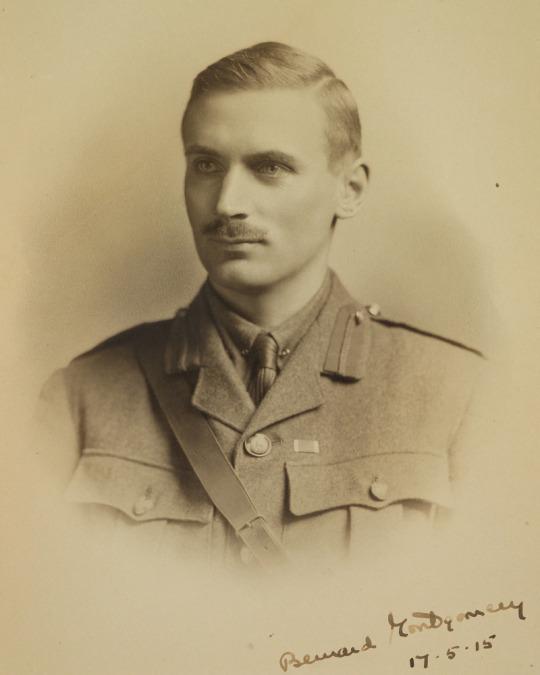
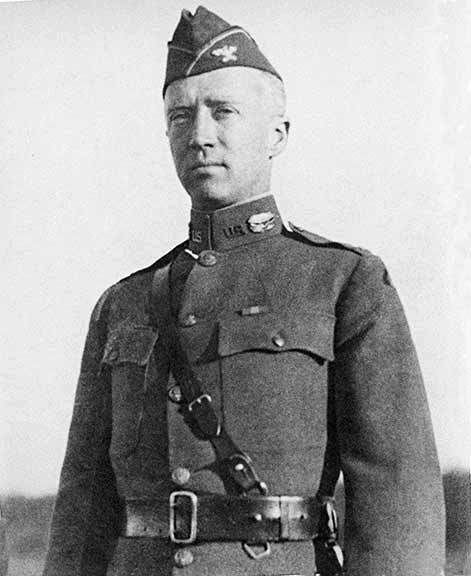
Born two years apart, both were commissioned within a year of each other and both were wounded in France in the First World War. Both men encompassed very different but very valuable characteristics in combat: Monty-careful and meticulous, Patton-dashing and diplomatic. Despite the differences, both generals demonstrated striking similarities: commitment to their careers, a ruthless egotism, interesting when you consider neither held superior command. This did not impede their desire for the limelight and fame in warfare, arrogance and the manipulation of colleagues in high places to advance their careers. Both were machiavellian in their own affairs and self-interested in their own personal progression.
The great rivalries amongst the Allies that made a real imact were Marshall and Brooke over war policy, Nimitz and MacArthur over resources, Eisenhower and Montgomery over strategy; and then between Percival and MacArthur for incompetence, Patton and O'Connor for aggressiveness, MacArthur and Clarke for vainglory, (and possibly Clarke and Wavell for the stupidity of letting defeated enemies escape), were the issues that defined the war for the Western allies.
The idea that a competition between Patton and Montgomery was more important is cute, but naive. I am not even sure where the idea comes from.
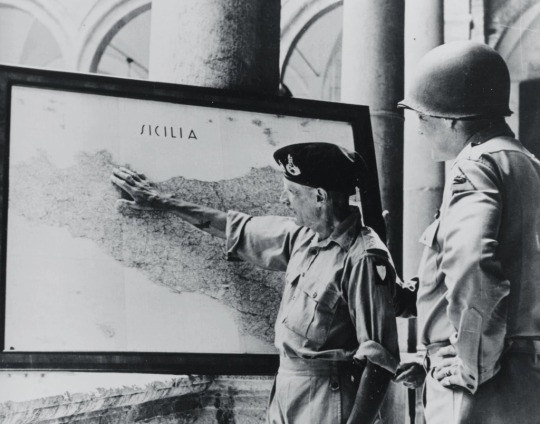
Much is made of the bet between Patton and Montgomery over reaching Palermo in Sicily first, but in practical terms that was the only time in the war that Patton ever appeared on Montgomery's radar.
For the rest of the war Monty was so much higher up the food chain than Patton that he was unaware, or disinterested in Patton's opinions. Montgomery was, by 1944, an experienced general who very successfully fought extensively in both combat and staff roles for 4 years throughout World War One. (Patton got a combat command for a few weeks when the Germans were already collapsing.) Montgomery led a division very successfully through the Battle of France, and a corps through the crucial Battle of Britain training and rebuilding years. He led an army in combat for two years, through many successful battles both on defense and in attack.
By 1944 Patton had led a corps for a few months, and an army for a few weeks. For the very brief period of the Sicily compaign they were theoretically equals in command, but probably only in Patton's mind. Montgomery saw Patton as an enthusiastic if amateurish old man but respected his aggressive boldness. Montgomery saw his HQ 'betting book' as a bit of fun (and was delighted when bet a B17 by someone who should have known better).
When he and Patton met and co-ordinated the Sicilian campaign Alexander seemed not interested in co-ordinating, Monty saw Palermo as a similar bit of fun to pursue, no bigger or smaller than the hundreds of other bets in the book.
Patton saw it, as he saw anything relating to his persona, as the most vitally important challenge of his whole life...up until the next one. Montgomery lost a bet and moved on to the next challenge. Patton won but didn't. (Or at least that is what bad writers have tried to suggest. I think he moved straight on to the next challenge anyway.)
That was the last time Monty and Patton were in direct competition, no matter what revisionists or romantics would say.
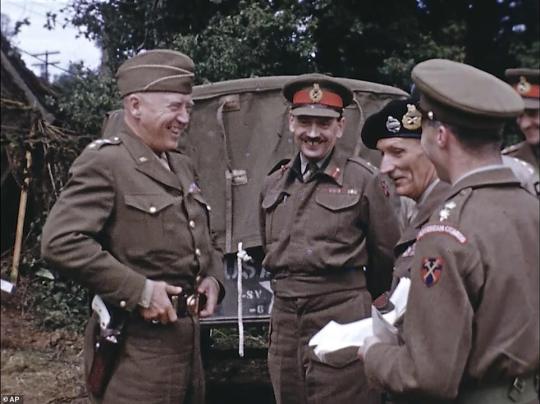
The next time Patton was allowed in the field he was one of half a dozen army commanders in Monty's Normandy army group, and, familiarly, he did not arrive until the Germans in Normandy were already collapsing. Very soon afterwards Eisenhower split off Bradley's army group, and Monty had no control, nor much interest, in what Patton was up to thereafter.
The romantics like to suggest that thereafter Monty railed against Patton's supplies, and that Patton railed against Montgomery's caution. The truth is less foolish for both of them. In fact Montgomery railed against Eisenhower's broad front strategy regardless of which of the other sub-commanders was benifitting (to the point of Montgomery making an offer to serve under Bradley as long as someone got single control to pursue a single strategy). He railed against the diversion of resources anywhere not at the main point where a thrust might have achieved early victory.
Leaving aside whether that victory could have happened, Montgomery's beef was with Eisenhower first, his appalling chief of supply Lee second, fellow Army Group Commanders who couldn't control the excesses of their subordinates like Bradley (and to a lesser extent) Devers third, and only then with the several army commanders who each tried to do their own thing.
In practical terms Montgomery seemed more appalled by the negative effects of the incompetence of Hodges (1st US Army,) and the obnoxiousness of General De Gaulle's orders to 'his' army (French First Army), and perhaps even the ineffectiveness of his own subordinate Crerar (Canadian 1st army) , than he did by Patton's enthusiasms. There is hardly a mention of Patton in his diaries through this period, compared to several comments on Bradley and De Gualle, and endless ones on Eisenhower.
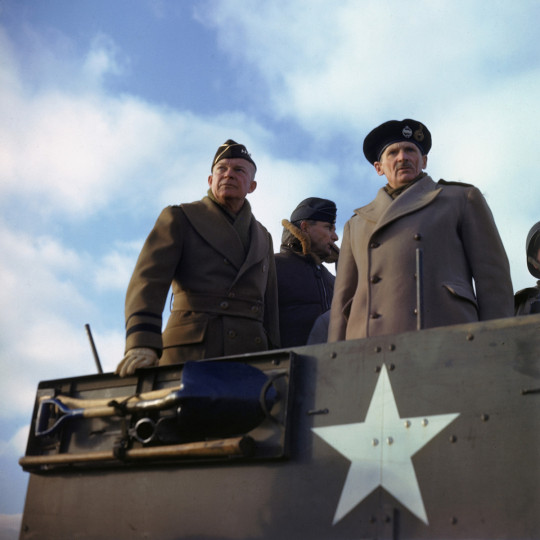
Patton too is being maligned by the pretense that his war was taken up with a vain competition with Montgomery. Patton, like Montgomery, was totally concerned with the main issue of defeating Germany. But unlike Montgomery, he did not have Brooke - the Chief of Imperial General Staff - to rely on for support against Eisenhower's broad front strategy.
Patton too was convinced that this was the wrong way to go, but to get his version of a thrust (with him at the front) happening, he had to be a bit more manipulative than Montgomery.
Every word Patton used to wheedle and manipulate support, or at least a blind eye to what he was doing, was designed to get more resources from his superiors. Indeed, if he couldn't get them from Eisenhower, he was willing to steal them wherever he could, and then get Bradley to pretend to not know what he was doing. In this he was quite willing to encourage Bradley's inferiority complex in relation to Montgomery, and to happily manipulate Bradley into tantrums to get what they both wanted, but it seems likely that Patton was more interested in getting his way by making his superiors compete with Montgomery, than in competing with Montgomery himself.
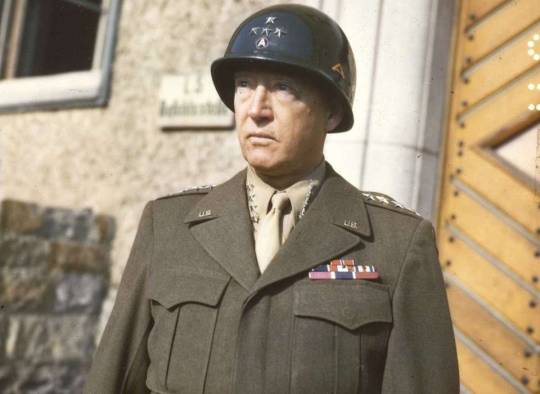
Patton is actually a more complex and clever character than the romantics give him credit for. His 'kill them even if they try to surrender' speeches in Sicily were part of his stage management of troops, not part of his innate personality. HIs 'us against the world' propaganda was more manipulative, not so much like Bradley's inferiority complex. He wanted to win, and he would use anything to get what he needed to win, even ramping up his superiors to distrust their allies. But his genuine competitiveness with Montgomery at this stage was less about him and Montgomery, and more about him and how he could maneouvre others to support him. He would have shown the same level of competitiveness, and the same willingness to undermine, any competitor at this point, British, French, Russian or even American.
Montgomery on the other hand only saw Patton as one more junior general syphoning supplies from an inadequate source. Montgomery was in competition with Eisenhower for control, and possibly with Bradley for resources. Minor army commanders in other people's army groups only registered on his horizon if he could get their armies assigned to his army group.
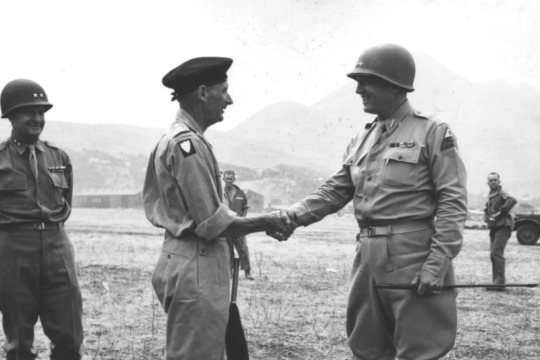
Just for amusement, it might be fun to consider how Montgomery and Patton might have worked together?
Montgomery was notoriously superb to serve under, no matter what your nationality. British, Australian, New Zealander, South African, Indian, Canadian, French, Polish, and American troops who served under him were all very happy to do so. So were their generals. Bradley certainly learned more about being a field commander from a few months of Montgomery's distant mentoring than from anything Eisenhower ever did for him in their much closer relationship.
There is no doubt that Montgomery preferred effective subordinates to ineffective ones, and it seems possible that Patton would have made a preferable subordinate to Crerar or Bradley in his mind.
As for Patton, he would have served anyone who got him what he wanted. Had Montgomery offered him the chance to spearhead the attack into Germany, there is virtually no doubt that Patton would have jumped at the chance.
Patton was not the racist that Bradley or Eisenhower were, and was happy to have black troops. He was not the American supremacist that Roosevelt or MacArthur were, and worked well with others (as long as they let him have enough lime light).
Had Montgomery been left as land forces commander, there is little doubt that he would have used Patton's aggression in a way that would have made Patton much happier than Eisenhower's broad front strategy ever allowed.
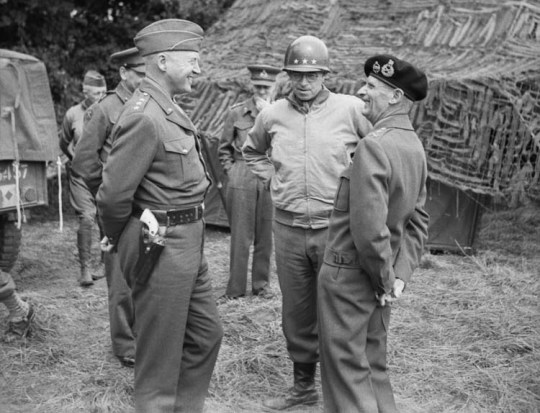
It is fun to imagine Montgomery as land forces commander using Patton's 3rd Army in conjunction with British 2nd to leapfrog ahead at top speed into Germany. The best British tactics were never the broad front strategy that the worst American's like Marshall and Eisenhower fancied. They were always the 'hold the enemy, crumble the enemy, breakthrough the enemy, and pursue with as much force as fast and far as possible' skills that had worked since the development of mechanised warfare in 1918. (As demonstrated by the Germans in Poland and France and Russia, the British and Germans in North Africa, the Japanese and British in Asia, and the Russians in Eastern Europe.)
Montgomery would have used his traditional two corps up, one back, one resting deployment, adapted to armies, to keep up the momentum. Patton's preferred tactics were almost exactly the same, and he and his 3rd Army would have fit it like a glove into Montgomery's thrust strategy.
Personally I think that the limited reality behind their competitiveness paid trumps in Sicily, and I wish that it had been repeated in France. Patton could not have been a worse Army group commander than Bradley was, and would almost certainly have been better.
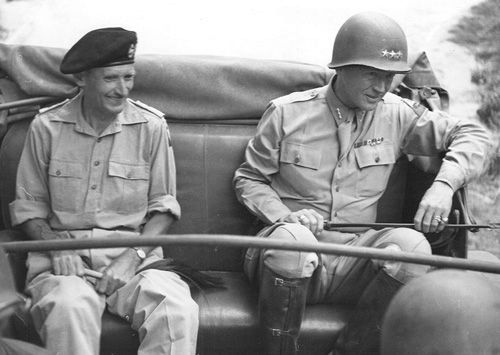
It is amusing to think of Patton and Montgomery effectively conspiring to destroy the broad front strategy while they got on with winning the war in the best spirit of competition. Although I have a sneaking suspicion that one of Patton's biographers was right to suggest that by 1945 he had suffered a few too many hits on the head, there is little doubt that he would have been almost as valuable to the Allied cause in Bradley's place against Eisenhower's policies directly, as he would have under Montgomery's army group. That might have been a useful version of rivalry.
#field marshal bernard montgomery#montgomery#monty#general george patton#patton#us army#british army#second world war#war#warefare#leadership#history#generalship#tank#eisenhower#military history#general bradley#general eisenhower#personal
58 notes
·
View notes
Note
can you explain in more detail why you think the PT weren't good friends for akiren? i'm not asking out of hate or to start drama, i just never interpreted things that way and i'm genuinely curious. i don't think them being brainwashed by maruki makes them "bad friends", but i don't know if that's what you meant either. i'd love to read a proper explanation on this that isn't just people arguing in the notes of that post.
Hi! Yeah, I know the ~discourse~ climate is pretty touchy and not a good place to exchange ideas, so I’ll do my best to put my thoughts on this matter into words.
Settle in, bc this one is long.
I’ll start off by saying I don’t dislike the PT, nor do I think they’re bad people, and honestly I think they love Joker a lot! Ryuji calling Akira after his fake death and talking about how his ideas on what makes a hero have changed because of Akira genuinely makes me emotional, along with dozens of other scenes with the thieves! They’re good kids who could be really good friends to Akira but that’s not what’s shown in the game. I don’t think it’s controversial to say Akira’s relationships with all of his friends are transactional. That’s kind of the point, all of his confidants arise out of deals, give and take, and in the metanarrative of the game, that’s how it works. You as the player help these characters solve their problems, and through ranking their confidants up, you get access to more gameplay perks. So it’s pretty even!! But like,,Akira, the character, isn’t the player. There’s no in-story mechanic by which he can cash in friendship points for being-good-at-killing-things prizes. Yes, he uses those abilities to not die in the metaverse, but there is no literal, in-universe way to explain how hanging out with someone translates to [insert gameplay perk here]. So you have to look at what is physically happening in the story. Akira hangs out with the PT, stands there while they have drama with another irrelevant character, and then one way or another their problems get solved and they swear to be Akira’s blood brother or whatever. Akira is a crutch for these characters, and they say multiple times that they wouldn’t have been able to do what they did without him. So all of their shit gets handled and Akira gets?? Like actually gets?? What? Inquiries about his well-being? Offers to help him? Questions about his life, his interests? No,,,not really,, But he gets access to a super powerful persona!! Yay!!! Bc everyone knows he’s just a little shadow-killing machine, right? And even the relationships he does get something tangible (as in separate from the mechanics of the game) out of, like Kawakami’s, are built on the notion that if Akira stops providing for whatever reason, the relationship will end. So essentially, Akira is under the pressure of filling whatever role his friends need him in for however long at any time, and he’s been led to believe that if he stops or fails, he will stop receiving any reciprocal care and acceptance.
(And I know this is all gameplay stuff, I know it has to be like this to codify the complicated process of human relationships, I know all of that, I’m just trying to find a deeper layer bc that’s what I do.)
This whole thing comes into pretty clear focus for me during the third semester when you visit everyone in the false reality. Everyone is happy to see him, of course, but they’re clearly wrapped up in their own happiness. Which is understandable, again, I’m not saying the PT need to be attached to Akira to be good friends, but it all still feels off to me.
If they know Joker, then they’d know it’s weird that he just shows up and starts asking these pointed questions while they’re in the middle of something. All of their other interactions with him have been led by them. Yeah, Joker approaches them bc the player has decided to hang out with them, but the other character always chooses the activity and leads the discussion. Akira showing up out of nowhere and asking them to “remember” and “move on” and whatnot should be raising some major red flags. And it clearly does, since their memories do start to return, but they’re all too scared of losing their happiness that they nope out of the conversation as soon as possible, without stopping to consider why Joker might be trying to reach out to them like that. They’re his friends; they should know he wouldn’t just be trying to hurt them or make them unhappy. After all, their entire relationship with him up til that point has been exclusively about Joker trying to help them. This doesn’t make the PT bad people, running away is a totally natural reaction in that situation. They’re just kids, and their minds have been manipulated to a point, but it’s not like they don’t remember Joker or the way they’ve grown since meeting him. In fact many of them mention how much they’ve matured recently, but they never actually relate that back to Akira, despite him being the primary driving force behind most of their personal arcs, even though they definitely remember him. Translation vagueness or deliberate nod to the idea that the PT don’t actually credit Akira with all the hard work he did after their initial lip service? Hmmm. Anyway, their failure to recognize that Joker is struggling just demonstrates to me what was set up all throughout their confidant links, that their relationships are transactional and that they don’t necessarily consider Joker and his individual needs outside of what he provides for them. And when they no longer need him bc that hole has been filled, he simply doesn’t occupy the same place of importance in their lives.
Makoto’s flashback in particular stood out to me, bc it was from a moment where she was specifically talking about feeling like she finally found a place to belong with the Phantom Thieves (and by extension, with Joker), but then she desperately tries to brush it off. Obviously that sense of belonging wasn’t meaningful enough to her for her to want it back. And I’m not blaming her, of course, any teenager would choose to have their father back over being in a vigilante group lmao, I just thought it was telling that the devs decided to show us a scene that was originally meant to be heartwarming as an example of the harsh reality Makoto wants to forget. All of the flashbacks are from defining moments for the thieves, but that one specifically got me like *thinking emoji*
So his friends are hesitant, despite the fact that they must know something is wrong. It’s understandable, they all stand to lose a lot if someone messes with the status quo. I genuinely don’t think I would react any differently. But there is someone who reacts differently and against his own self-interest. It’s Goro, the one who has arguably the most to lose, who doesn’t turn away from Akira. He seeks Akira out and teams up with him to uncover what’s really going on, even though he has every reason to believe that prodding too deep will literally mean the end of his life. He forces Akira and himself to face the truth because he knows anything else would just be an insult to what they’ve suffered so far. He’s the only one who never flinches, and that, more than any of his friends’ come-to-jesusing (which Akira still has to initiate) is what Akira needs in that situation. For the first time (outside of the brief instances in the tutorial levels), we see a situation where Akira is actually the dependent one, the one who needs help, who needs support. And the only one who has ever provided that, unconditionally, without demanding anything in return, is Goro. I could go into how Goro’s confidant blows all of the others out of the water in terms of building both himself AND Akira as characters, but it’s been said already and by smarter people than me. But basically, despite competition being a core theme of their relationship, Goro is the only character who is portrayed as Akira’s equal. Their contests are all in the name of improving not just Goro, but Akira too. Goro is the only character who expresses an interest in Akira’s inner life and development, and as such he knows Akira better than anyone else. So when Maruki tries to trap them all in a gilded birdcage, Goro won’t stand for it and he knows Akira won’t stand for it either. That’s why he’s so betrayed if you choose to accept the dreamworld. You’re negating the basis of your entire relationship with him and going against your own principles. Out of every character in the game, the one who knows Akira best and refuses to abandon him even when that could mean his own death is Goro Akechi.
I want to reiterate: I do not hate or even dislike the PT!! And tbh I don’t really think they “abandoned” Akira. That post, imo, is supposed to be kind of hyperbolic. Unless it’s referring to how many of them literally sprint away when he comes to talk to them lol. I look at it more like a commentary on how thoughtlessly the PT act as soon as their wishes are granted. I know it’s set up linearly for story purposes, but isn’t it kind of sad how no one checks up on Akira in the week he’s going around talking to people? Especially after he’s been acting so comparatively weird? It’s not unusual that they might be caught up in other stuff, but while you’re going around and visiting everyone, you don’t get a single text or call from ANY of the thieves, for a whole week!! Goro even comments on it directly with his pointed little “I’m sure you’re just as close as you were before” comment. God, he’s such a bitch. Ultimately, the PT do get their acts together, and it’s partially out of the realization that Akira is struggling alone against something and needs their help, which I love and appreciate. I think they are good friends who want to support Akira, but they can’t understand him past the role they’ve placed him in, and until they do, they’ll never be able to be what he needs. Akira loves his friends and knows he can rely on them in most ways, but those relationships will always be dogged by the pervasive fear that he must constantly earn the right to have the relationship at all. What he needs MOST is someone he doesn’t have to perform for, and from what we see in the game, none of the thieves fit that bill. Except Goro.
I know this was long and rambly and probably pretty disjointed but I wanted to be as thorough as possible and all of my thoughts just sort of gushed out. Obviously ymmv about all of this depending on how you interpret the game, but this is what I arrived at thanks to my analysis so this is what I have for you! Thank you for coming to my Ted Talk
#ask tag#anon#this is not an invitation for argument or discourse#i simply wanted to provide my interpretation of things#rude and probing questions will be deleted :)
18 notes
·
View notes
Text

Bellow the cut is my really lengthy MLA formatted essay on Itsuki’s memory concerns. This was written for a class, so that’s why it’s written the way it is. I’m too lazy go go through and edit it much so you’re getting it in it’s raw glory:
The Haruhi Suzumiya franchise is full of many mysteries; as a series that only just a few months ago left a nine-year hiatus in which there was little to no content released that contributed to the greater story at hand, there are a lot of unanswered questions in the novels that we likely won’t be getting any answers to anytime soon. One of those being the character of Itsuki Koizumi. As of the date this essay has been written, Itsuki is the only main character in the novels that has not had an entire book dedicated to his character and struggles. Haruhi Suzumiya, the titular character, has The Melancholy of Haruhi Suzumiya and The Sigh of Haruhi Suzumiya; Yuki Nagato has The Disappearance of Haruhi Suzumiya, Mikuru Asahina has The Intrigues of Haruhi Suzumiya, and Kyon is the main narrator of the entire series, which means every single novel has focused on him. However, out of the eleven books released thus far, Itsuki Koizumi has only been relevant as a means to give exposition to our main character or in side-stories that give us little insight into his real nature/character. However, there may be a reason as to why he is the most mysterious of the bunch, aside from that being his defining character trope when introduced. That reason has to do with his memory.
Throughout most novels, Itsuki has given us an excellent insight into his thought process. As a character whose primary purpose is to provide the audience with much-needed explanations for what’s going on, you would think that was all he is: a way to give information. However, Tanigawa is known for subverting tropes in his work, and Itsuki Koizumi is no exception. While Itsuki is brilliant, he makes one thing incredibly clear throughout his words: he is not sure if what he is saying is true. Every time he gives Kyon information, it is done in a way that is deemed theoretical. Itsuki is constantly speculating on what’s going on in the series, and we are led to believe that he is an unreliable narrator, much like Kyon himself. Itsuki refers to himself as a skeptic to the Agency’s theory that Haruhi is “God” and brings up plenty of counter-arguments to that theory. He says that he is in the minority of believing that, however, and thus bounces ideas off of Kyon to get a better understanding of what’s going on around him. This brings up our first issue with his character. As, in The Surprise of Haruhi Suzumiya, Kyouko Tachibana- who is a member of the organization that rivals the one Itsuki is from- says this: “...didn’t you know? Koizumi created the Agency from the ground up. He’s been the leader from the very beginning” (Tanigawa 2011).
If this fact is true, why would Itsuki be at odds with the Agency’s views of Haruhi? A lot of information that Itsuki gives Kyon about the Agency is contradictory. While one can infer that he’s just been lying this entire time, we also know that Itsuki is too smart to have holes in his story like that. Not only has he been proven to be a great improviser, but a convincing one. This can be showcased any time that Haruhi has a run-in with a supernatural force. To keep her from finding out that such things exist in the world, he has come up with explanations on the spot for unnatural happenings. While to Kyon and us the audience, they seem ridiculous, that’s also because we know what’s going on. To Haruhi herself, a character who has been proven to be incredibly perceptive, they are convincing. To think that Itsuki would be contradictory in his statements about the Agency, which even has Kyon put suspicions on him, is something I find suspicious in a different way.
In The Melancholy of Haruhi Suzumiya, Itsuki introduces himself as a subordinate of the Agency. And, up until The Surprise of Haruhi Suzumiya, that statement seems to check out. While we always get the feeling that Itsuki knows more than he lets on, his rank in the Agency is never in question until the second to last novel (as of writing this). At the end of the Surprise novel, Kyon decides to question Itsuki about his place in the Agency. He says that he assumed Mori, another member of the Agency, was his boss. He explains to Itsuki that Mori refers to him very casually, but he wonders what she refers to him as when not around. In the English translation of the novel, some of the nuisances are left out. Kyon refers to honorifics here, suffixes added to the end of names that help signify a relationship between you and the person you’re talking to. Mori refers to Itsuki by his last name, without any honorific, when Kyon is around; that signifies that she is either above him or on equal footing with him. Kyon is wondering if Mori refers to Itsuki more formally in a closed setting, trying to tip-off to Itsuki that he has suspicions that he may have been lying to him about being a subordinate in the Agency. Then, Itsuki says something that completely disregards everything he has explained about his position in the past: “...we don’t have the kind of hierarchy that exists in a corporation. There are no superiors- everyone is the same. There’s no hierarchy among comrades” (Tanigawa 2011).
Another interesting thing to note here is that this is the same book that Itsuki says he will have to rethink his past theories and finally proclaims that he himself believes Haruhi is a God. While it’s subtle, this is undoubtedly a large shift in his character, and one might assume that Itsuki changing up his story so late in the game would be out of character for him- they would be right. However, it is not without proper build-up. In fact, throughout many novels before this, Itsuki hinted that his memories are in danger.
Itsuki’s character revolves around mystery, so you have to look at everything he says with a critical lens, especially if it seems out of place in a conversation. All of this memory-related paranoia from him started after The Rampage of Haruhi Suzumiya, specifically the story Snowy Mountain Syndrome. Yuki Nagato falls ill while they’re trapped inside a time-warping mansion in the middle of a blizzard. Under these circumstances, Itsuki makes a fundamental promise to Kyon: “If a situation should ever arise where Nagato is in a great deal of trouble [...] I will betray the ‘Agency’ one time and ally myself with you” (Tanigawa 2004). Not too much later in that scene, Itsuki ensures Kyon that he is still loyal to the Agency; however, the Brigade is starting to become more of a priority. A few books later, in The Intrigues of Haruhi Suzumiya, he makes his stance more clear “If asked which side I belong to, the SOS Brigade comes to mind, first and foremost. My feelings tend toward it, rather than the Agency [...] If the Agency gave me an order that ran counter to the interests of the SOS Brigade, I might find myself upon the horns of a dilemma” (Tanigawa 2005). These are not statements that make sense under the idea that Itsuki created the Agency, but Kyouko also has no reason to lie at that moment. Not to mention, Itsuki’s behavior after making these statements runs counter to the idea that he is lying about his loyalties to gain Kyon’s trust. I will get into that soon. Something to consider here is the idea that Itsuki himself is unaware that he is the Agency’s creator. While that sounds convoluted, it begins to make more sense as you consider Itsuki’s behavior in the books following The Rampage of Haruhi Suzumiya.
One thing to remember about Itsuki is that he is smart. While he claims himself not to be a genius, in The Surprise of Haruhi Suzumiya, it is confirmed that even people from the future consider him a dangerous individual because of his above-average ability to infer things. The Mikuru Asahina from the future even states that “A single careless word from me could become ten words’ worth of information for you” (Tanigawa 2011). Needless to say, he’s very perceptive. So, when Itsuki begins making claims that are alluding to the fact that his memories may be tampered with in the future, it isn’t something that we should brush off as the readers.
The book that features his worries quite prominently is the first big story after Snowy Mountain Syndrome: The Intrigues of Haruhi Suzumiya. I’ll be going through the two most essential hints Itsuki gives us towards the idea his memory may be getting tampered with, starting with Itsuki’s indications that there are other kinds of espers.
Up until this point of the series, we assume for the most part that all espers are like Itsuki, as in, their powers are limited. Itsuki is only able to use his powers under specific conditions. Said conditions begin when he enters the closed spaces made by Haruhi to fight off Celestials, a subconscious representation of her negative emotions and desire to recreate the world. Itsuki has claimed in the past that the Agency must destroy the Celestials and stop Haruhi from subconsciously destroying the world with her powers and that it is their purpose for existing. And then, Itsuki drops this: “I am an esper- though my abilities and range are a bit limited. But can you be sure that I am the only one? I don’t mean anti-Celestials like me. How can we say for certain there aren’t more straightforward superhumans with, for example, the power to see the future, perhaps even attached to the Agency” (Tanigawa 2005). When Kyon asks whether or not people like that exist, Itsuki claims that he’s unsure since he is “an underling” and is kept in the dark about these things. However, Itsuki never brings up a theory of his when he doesn’t have reason to believe it. While usually, Itsuki backs up his points, here he refrains from giving too much information. It’s not out of character for him to do something like this, though. It’s often that Itsuki only gives Kyon enough information to come to conclusions independently, rather than try to force his own opinions and beliefs on the main character. The idea that there are espers with capabilities we are unaware of is something to keep in mind when considering the biggest hint that Itsuki gives us: his blatant paranoia about his memories being erased.
Later on, in The Intrigues of Haruhi Suzumiya, Itsuki reminds Kyon that he has become incredibly grateful towards the Brigade and the opportunities it has allowed him to have. In addition to that, he asks Kyon if he remembers what he said to him during the incident they had on that snowy mountain. Of course, Kyon states that he remembers- claiming that if Itsuki ever went back on that promise, he would join forces with Haruhi and “come up with a punishment the likes of which he’d never seen” (Tanigawa 2005). Then, Itsuki states something peculiar: “That’s a relief. If I ever suffer from amnesia, things will be alright- you’ll remember for me” (Tanigawa 2005). In the book right after this one, The Indignation of Haruhi Suzumiya, Itsuki makes a similar comment on the topic of remembering his promise about protecting Nagato: “‘I remember it, of course. And even if I did forget, I’m quite certain that you’d remind me. Wouldn’t you?’ He smiled pleasantly and gestured. ‘When the time comes’” (Tanigawa 2006). His concern regarding memories starts extending to Kyon in the next book, The Dissociation of Haruhi Suzumiya, in which Itsuki’s mental/emotional state seems to be taking a turn for the worse. Kyon comments on how any normal person would be fatigued dealing with Haruhi on a daily basis, and Itsuki responds with the following- I will quote the passage in its entirety, as it’s something that isn’t easily paraphrased:
“I am not speaking in conventional terms. You do remember my true nature and responsibility, don’t you? The real reason why I am here?”
At first it was to observe Haruhi, and then it became being her flunky, I said.
“Excuse me, but surely you haven’t forgotten that I am an esper, nor have you forgotten when, where, how, and with whom my powers are utilized.”
I remembered all right, having gotten enough of an earful about it. His confession had come after Nagato’s and Asahina’s- in other words, it was the most recent information about a brigade member to come to light.
“That’s good. That will make this easier to explain.” Koizumi gave an affectedly relieved sigh, then lowered his voice. “To be honest, I haven’t been sleeping well recently. I’ve been waking up in the middle of the night or early morning, day after day, and not because I want to. It’s taken quite a toll on my health.”
Throughout the rest of their conversation at the beginning of this book, Itsuki is constantly asking Kyon if his memory is faulty or if he had somehow forgotten recent events that lead up to their current situation. At the end of that lengthy conversation, we get another critical exchange that would be more beneficial not to paraphrase as well:
“So, you’ve finally managed to arrive at that point. I was starting to wonder if it had been erased from your memory.”
What good would it do anyone if I’d lost that memory? I asked.
“I can’t guess at the possible profit or loss, but if I could erase it, I would very much like to.”
That didn’t make any sense. I’d never heard anything about Koizumi being able to control memories, and anyway, if he could, then he ought to be doing something about Haruhi’s head.
“You are quite right.”
He didn’t have to sound so wistful about it, I said.
One thing that both of these exchanges make clear is that memory, and memory loss by extension is something significant to Itsuki. And throughout the series, he has become more and more adamant about making Kyon aware of that fact. What can be gathered from the information he is feeding us that there is someone, somewhere- most likely allied with the Agency- who has the power to alter people’s memories. Itsuki seems to be aware of said individuals and appears to fear the idea of having his memories altered by them. The fact that he is also asking Kyon if his memories are still intact is likely because Kyon seems to be the only person that Itsuki has mentioned his promise and loyalties to. If his memories are altered, it likely means they’re coming for Itsuki next. If Itsuki’s memories are altered, he seems to be hoping that Kyon will remind him of his true feelings and goals.
As of right now, we have no idea who this individual is or if they even exist, but we can infer without a doubt that there is something going on involving Itsuki, his loyalties to the Agency, and his memories. The fact that his statements on the Agency contradict himself, the way he drops hints that go from subtle to incredibly obvious, the way his attitude subtly changes from being overly polite and accommodating to becoming more serious and practically demanding Kyon confirm that his memories of Itsuki are still intact for several books. Tanigawa is not an author who gives the readers things at face value. A genre that repeatedly appears in the Haruhi Suzumiya light novels is mystery. In the newest release at this date, The Intuition of Haruhi Suzumiya, the characters read through a set of stories sent to them by their friend Tsuruya. Their goal is to figure out the secrets in hiding meanings behind them by reading deeply into the text, phrasing of words, and placement of dialogue. As the series is writing from a first-person perspective, it’s only natural to infer this as a hint to the readers to read deeper into the texts presented to them. And, the more you look, the more you can find. Regardless of whether or not this new book is meant to be a hint to prepare us for future novels or not, one thing is sure: something big is going to happen involving Itsuki Koizumi at some point in the series. With all this build-up and foreshadowing, it is almost guaranteed that something will happen or has happened to change his memories about his promise and/or his loyalties. We’ll just have to wait until the next installment to see.
#when i say haruhi is perceptive im referring to her mystery solving abilities NOT her ability to detect the supernatural#that is nonexistent#≪ 🎭 ⇒ ɢᴇɴᴇʀᴀʟ : study ⇢ a hint of truth. ≫
18 notes
·
View notes
Photo
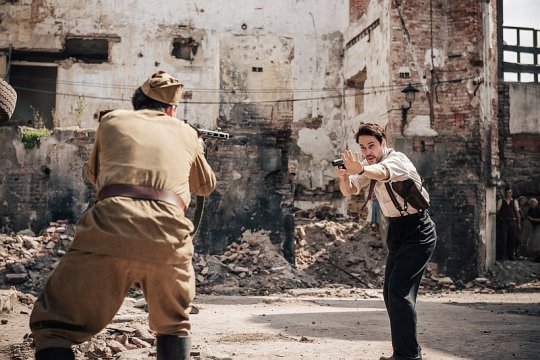
Taylor Kitsch, an actor known for his roles in such Hollywood productions as "Battleship: Battle for Earth" and "X-Men Origins: Wolverine", is starring in the new Canal + series "Defeated". In an interview, the actor reveals what he remembers from history lessons, what connects the series' story with the modern world. He also explains why, according to him, every person should visit the former concentration camp of Auschwitz-Birkenau.
Taylor Kitsch started his adventure in Hollywood as a "hottie" - an actor associated with a great body and beautiful face. All because the first role that brought the popularity of the former model Abercrombie and Fitch was the character of naughty lover Tim Riggins in the cult series "Friday Night Lights".
Kitsch did not avoid tough moments in his career - for example, when the $ 250 million John Carter, his first such big role, suffered a disgusting box office failure. But the Canadian knew this taste already - after coming to the USA, he was homeless for some time before finding a job.
For years, he has been successfully playing in big titles and alongside big names. Oliver Stone ("Savages"), Ryan Murphy ("Heart Reflex"), roles alongside Chadwick Boseman ("21 Bridges"), Michael Shannon ("Waco"), Michael Keaton ("American Assassin") and Rihanna ("Battlefield ), the HBO series "Detective," starring Vince Vaughn and Rachel McAdams. Meanwhile, Kitsch finds his way to charity, especially for children.
From 1 January 2021, we will watch him in "Defeated" . There he plays the role of Brooklyn policeman Max McLoughlin, who in the summer of 1946 is sent to Berlin, which is divided into four spheres of influence. Its task is to support the emerging police structures in the rubble. But upholding order in a space of brutality and lawlessness and clashing political forces - French, American, British and Soviet - will not be easy. Especially since Max does not know that he is used as a pawn in the game to open the Cold War, and somewhere in the maze of Berlin rubble lurks his brother Moritz, a self-proclaimed Nazi hunter who will stop at nothing ...
In addition to Kitsch, the main roles will be: Nina Hoss (local policewoman Elsie Garten), Sebastian Koch (criminal known as Engelmacher, Al Capone of post-war Berlin), Logan Marshall-Green (Max's missing brother, Moritz) and Michael C. Hall (consul Tom Franklin ).
The "Defeated" takes place in Berlin, right after the war. When you decided to play Max McLoughlin, did you have any knowledge of what the situation in Germany was like then?
The seres begins six months after the end of the war. I have the impression that this is a moment that is missing in the educational process - we learn a lot about the war itself, but about what happened immediately after it, for example, I had no idea. The plot of "Defeated" is made up, but our director Måns Mårlind (co-creator of the hit series "Bridge over the Sund") constructed it on the basis of many true stories. I have the impression that fact and fiction are perfectly balanced here. In the process of preparation, he gave us many documentaries and articles that helped to build an idea about the climate of the city from 1946. Discovering the next details of the story was fascinating for me.
Your work gives him a chance to get to know the world, its history, extraordinary places and people. Do you appreciate it?
This is the best part of my job! With each new production, I have a chance to immerse myself in its world and get to know it thoroughly. It could be a war movie like "Survivor", a story about a cult leader ("Waco"), the world of a detective ("Detective") or the beginning of the AIDS epidemic, as in "Heart Reflex". When I was an aspiring actor learning to act in New York, I never imagined that I would be able to live and work like this. Train with Navy Seals or meet Larry Kramer [American playwright, writer and activist for LGBT rights - ed.]. I am very lucky!
Prague, where you shot "Defeated", is a cult city for many Polish filmmakers, due to the famous FAMU school, but also a popular, atmospheric excursion destination. How was your time there?
Lovely. He will refer again to the privilege of working like this: six months in such a wonderful place, it is almost immoral! The only downside was the tight schedule so I didn't discover all the nooks and crannies that I had on the agenda. Fortunately, my driver, a guy in his fifties, was a great-grandfather from Prague, very talkative, and from him I learned the most interesting things - stories about the adventures of my ancestors and friends! Besides, in Prague, if you want to take a history lesson, you go out twenty meters in front of the front door - and it's already getting started. We shot in the summer, before Covid. We had an international team - Czechs, Swedes, Russians, Germans, French ... In use - not only behind the scenes, but also on the set - several languages simultaneously. Really, the only problem for me was my diet. Flour, red meat, stews ... I don't really like to eat like that. At least the beer was delicious, really amazing! In general, I really liked the culture of drinking and eating outside, these gardens, the community ... wonderful thing.
Due to the fact that the film was made in Europe, you had the opportunity to see places related to the war with your own eyes. What made the greatest impression on you? I was lucky, although it is not quite an adequate term that during the shooting we managed to visit the site of the former Auschwitz camp. Of course I knew, I had read about concentration camps before, but this direct contact with the site was invaluable, it gave me a clear idea of what happened. It is difficult for a man to believe what he sees around him. He's standing right next to him, yet he doesn't quite believe it. The space made a huge impression on me. I did not realize how huge Birkenau was, how perfectly organized the entire extermination was. This architecture, the surrounding houses, barracks. Someone designed it, thought over the function down to the smallest detail, and during my visit, I had the chance to trace how and where the whole process took place, step by step. I was standing there and it felt like I was choking, my whole body ached. Such experiences helped me a lot to bring my character to life. Max did not survive the camp himself, but he appears in a place marked by this tragedy, the tragedy of World War II, it affects him. I wish everyone could visit this place because it is a life changing experience.
Movies set in the past can be a perfect mirror for what is here and now. What analogies do you see between that reality and today's world? - Division, the dictate of fear, fear of the unknown, of otherness. Different ways to work through your trauma. These are all threads that connect the "Defeated" space with our reality. For my character, especially the experience of trauma resulting from family history, from the relationship with my brother, becomes the key. They both underwent a similar shock, but their reactions were completely different. I found it very interesting. Max is still hoping for a change, Moritz, as the saying goes, "the platform is gone". They have a completely different perception of one and the same event. Again, it is also a very contemporary thread - one event, situation, and extreme different opinions about it.
Your hero comes from Brooklyn, after you came from Canada, you spent a lot of time in New York. What is so special about the atmosphere of this city that gives it such a "mythical" status? For me, it has always been, I fully agree! Scorsese's "Streets of Poverty" has always been such a cinematic quintessence of New York, with its excellent Keitel and DeNiro. This film is set in the 1940s, which is the present day of Max. He was my point of reference in terms of the accent. Those years were difficult, the inhabitants struggled to make ends meet, and that also had to affect my character's character. Besides, New York has a chic character, New Yorkers feel proud of their roots. It's also something that Max defines.
And you had to transfer this New York feeling to Berlin ... ... to the razed Berlin, which for Max becomes, in a way, another space of trauma, personal again, but this time much more intense.
For this role, you had to master not only a Brooklyn accent, but also the German language. It was difficult?
I had an amazing accent teacher from Berlin, Simone. My rock! Fortunately, Max is an American who speaks German poorly and not a German, because if I had to play a German, I would have had a nervous breakdown! German is a damn hard language, especially for someone who wasn't exposed to such sounds when growing up. I learned everything phonetically. Sometimes I was "suspended" during the scene and then I was saved by Nina [Hoss, a great German acting and screen partner of Kitsch - ed.]. In my career, I have had to play with a South African, Texas, New York accent ... I've learned that there is no such thing as an optimal effect, someone is always dissatisfied. I focus on the vision agreed with the creators and I stick to it. Language is an amazing link between the actor and the protagonist, gives a unique insight into his state of mind and view of the world. I definitely prefer to play the character with an accent than to speak as usual. It's a great transformation tool. The arrangement of the lips, the appearance of the face, and the term are changing. In "Waco" my character, the guru of the sect David Koresh, had an unnaturally high, soft voice, which immediately made the viewer feel differently.
We associate you with American hits, but you are, like Ryan Reynolds or Ryan Gosling, Canadian. Do you feel like an American, or is Canada a state of mind after all?
I started my adventure with the USA when I was 20, I came to school. Now I'm forty, so I've spent half my life here. Madness! Over time, I have grown into this space, I have settled down and I feel at home. I'm talking to you from my home in Austin, Texas. But at the same time, I'll always be Canadian. I go there often, visiting my family and familiar places. Maybe I'll go back one day, who knows?
You've had moments in your career that turned from a promise of triumph to failure, such as the high-budget John Carter, who failed at the box office. Do you have something that you already know: "I'm avoiding this"? I don't have things that, as a rule, I don't do or know that I will never do. But there are some that I don't like. These include radical weight changes. My dear friend must have gained twenty-five kilos for a small, independent film. The first week was great because you eat what you want, then depression started, joint problems, sugar jumping ... I never put my back, but I lost weight. I lost a dozen kilos for the role in "Waco", before that for the "Bang Bang Club". It's fucking hard and very exhausting, especially the older I get. My body and head hate it! Also, until Scorsese calls with some great proposal, I say: enough.
16 notes
·
View notes
Link
A special kind of magic happens when kids gather around a table to play a fantasy role-playing game. Legends are born, friendships are forged, and they begin to experience real-world personal growth.
For the past seven years, we have been using tabletop games as therapy to help kids become more confident, creative and socially empowered. We're ready to help thousands of children around the world, but we need your help!

Critical Core is a tabletop role-playing game designed to help kids on the autism spectrum build social skills and confidence. It's a great way for parents to engage with their children at home, and for professionals and experienced gamers to use as a group social skills tool.
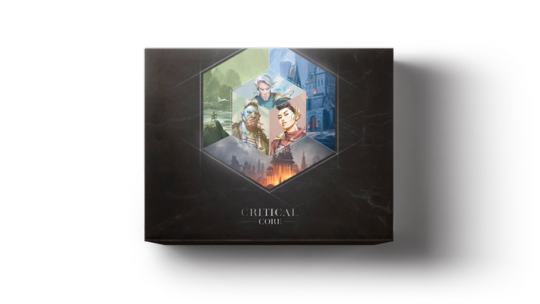
Critical Core is brought to you by Game to Grow, a 501(c)(3) not-for-profit organization, and co-developed with autism advocates, parents, therapists, and educators.
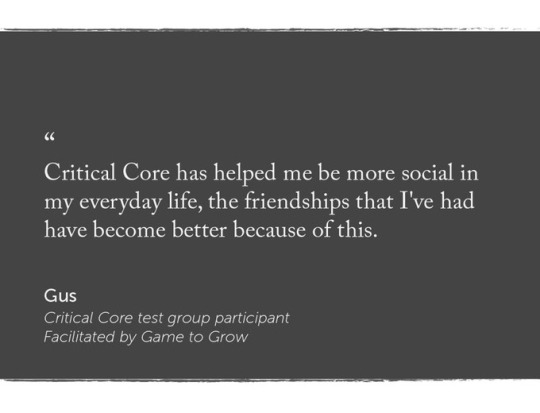

Suitable for cognitive age 9+, including teens and adults.
2 to 4 players recommended, plus one adult that acts as the facilitator. (Game Master)
Players must have basic listening and verbalization skills.
When running games with young players on the spectrum, parent or certified therapist should be present.
Experienced gamers will be able to integrate Critical Core into their favorite platform: Ruleset is adapted and streamlined from D&D's 5th Edition OpenSRD.
A great introduction to tabletop role-playing games for everyone.
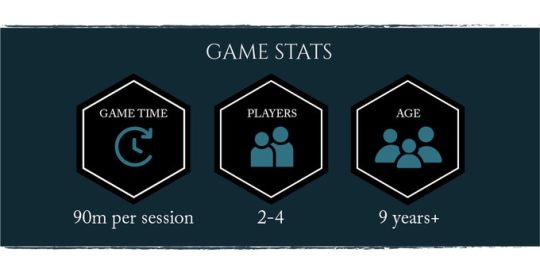

The Critical Core Starter Set has everything you need to play. The game has been tuned to be as easy as possible to get started and stay engaged.
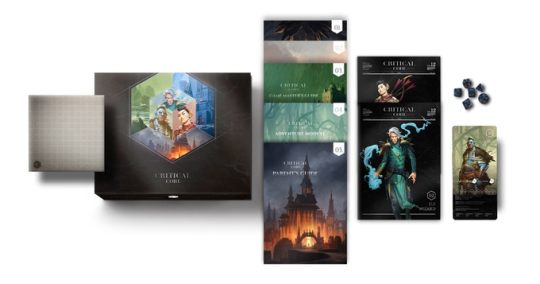
Facilitator's Guide - For parents, therapists, and Game Masters, our best practices on running fun and effective therapeutic gaming groups.
Player & Game Master Guides - Quick-start rules and playing guides for players and Game Masters.
Adventure Modules - Tested and tuned to be challenging and fun.
Dice (4 sets) - One for each player, one for the Game Master. Enough to run a 3 player game out-of-the-box.
Character Sheets - 4 popular hero archetypes, each with their own unique abilities.
Game Cards - Not required for play, but helpful aids for both players and Game Masters - Visualization, quick-reference rules, and spell cards.
Game Tokens - Visualization aids for working with the included map.
Reusable map - whiteboard marker friendly.
Please note: Artwork shown is work-in-progress and may be subject to change!

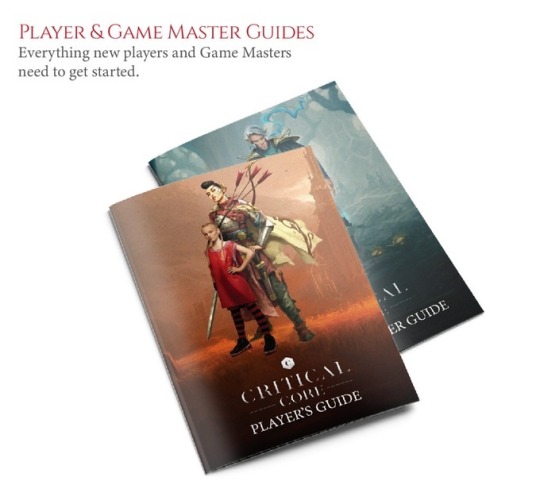
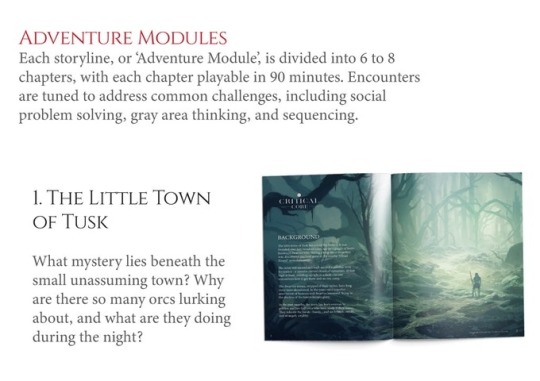
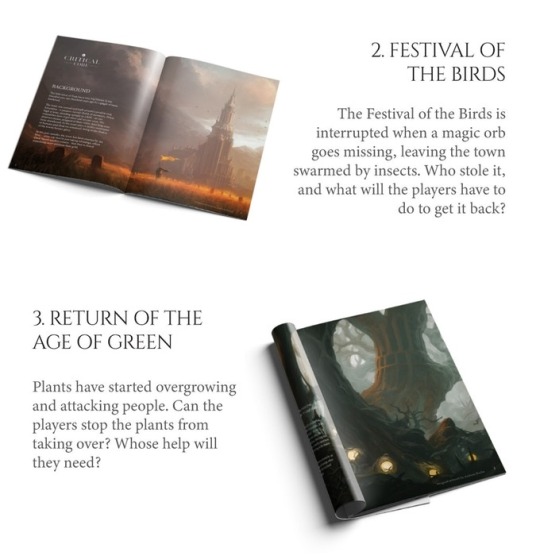
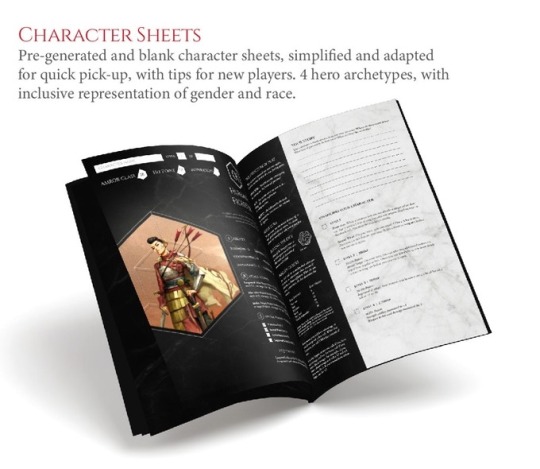
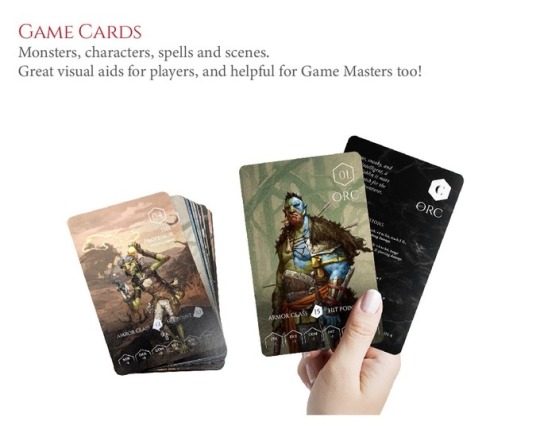
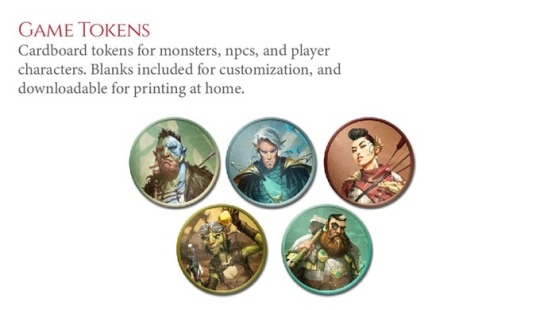



Critical Core is fit-for-purpose, designed to help neurodiverse players get started and stay engaged. At the same time, facilitators are provided with the right tools to make the experience effective without it 'feeling like therapy'.
Each encounter the players face is targeted to help build strength in areas that are related to challenges associated with autism spectrum disorder.
Critical Core is scaffolded around the DIR/Floortime model, and game encounters map to the FEDC framework. (Function Emotional Developmental Capacities)
But all of this is under the hood. At its heart, Critical Core is simply FUN.
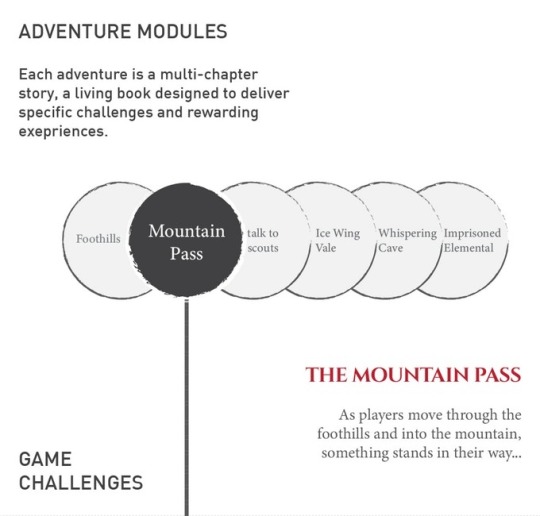
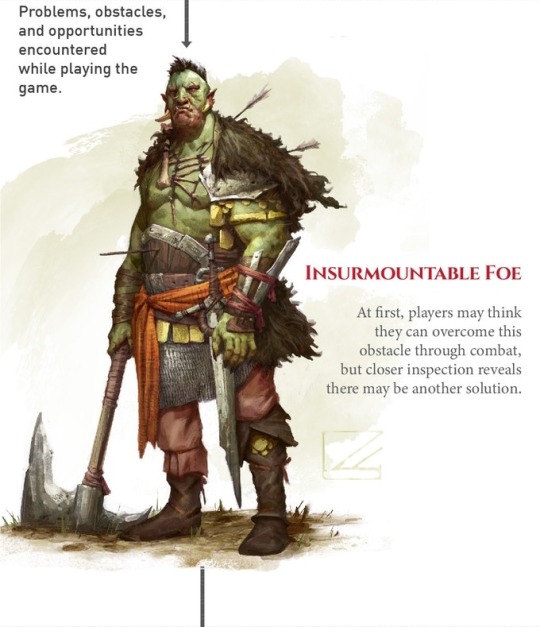
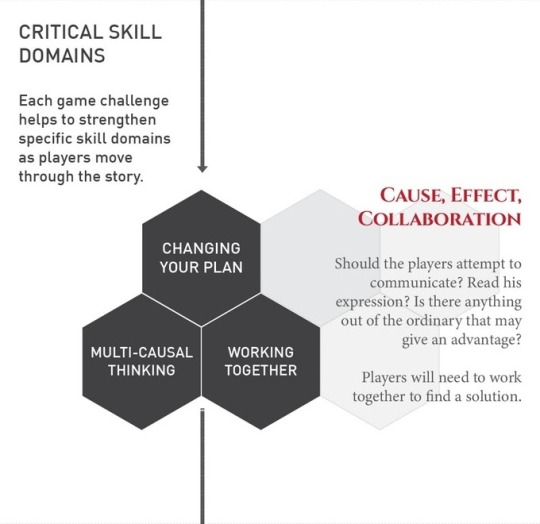
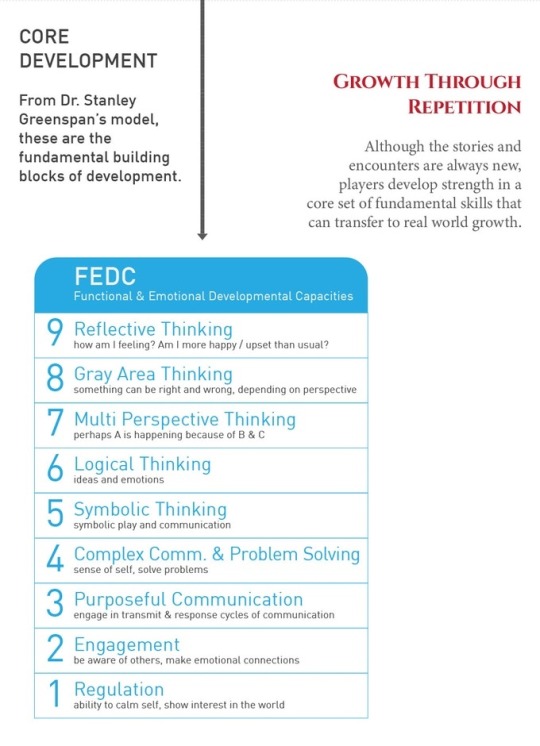
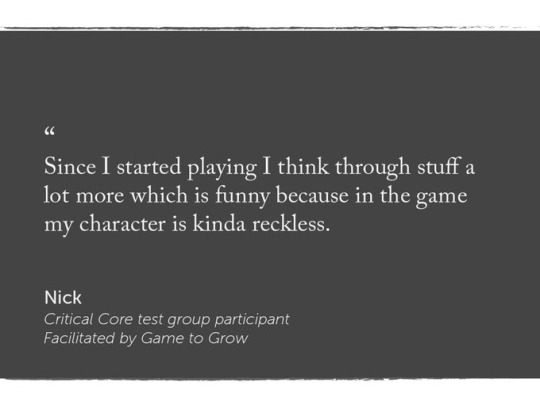

When kids engage in a world of fantasy play they are free to explore new ideas and relationships in a safe and fun sandbox. Skills learned while playing Critical Core can last a lifetime.
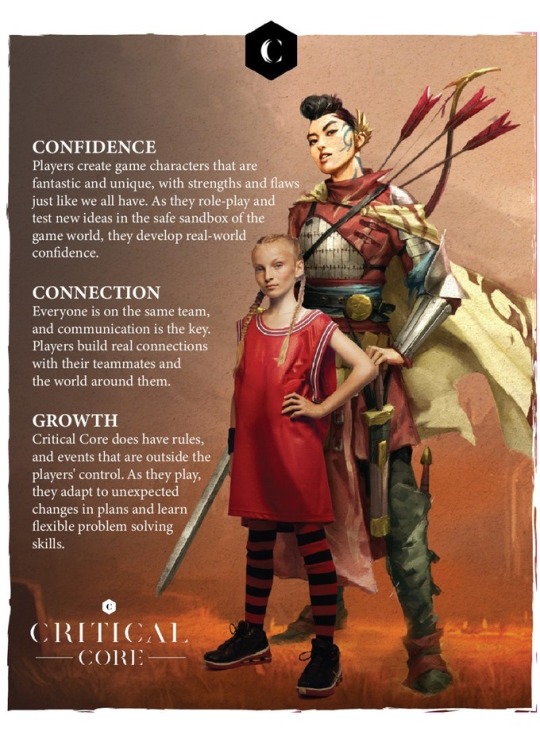
Although designed for kids on the autism spectrum, Critical Core is just as beneficial (and fun) for all kids. It's an easy stepping stone into the fantastic world of tabletop role-playing games.

Critical Core is built on established developmental frameworks and distills seven years of practical gaming therapy experience into an easy-to-use format. It is an amazing tool that can be used at home, at school, in a therapist’s office, or out in the community. And above all, it's great fun.
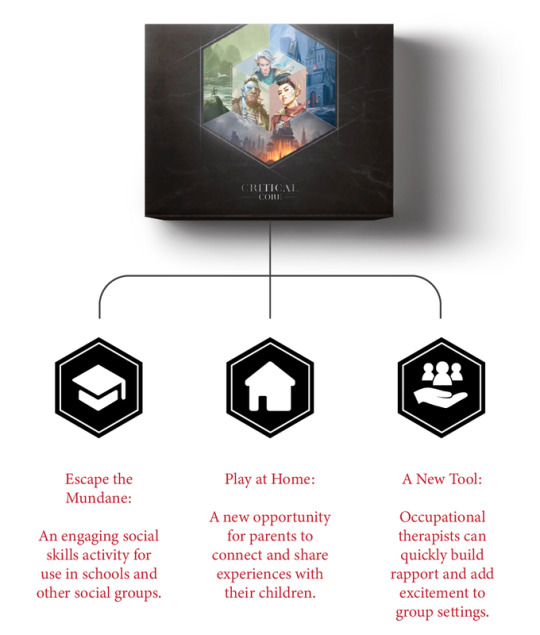
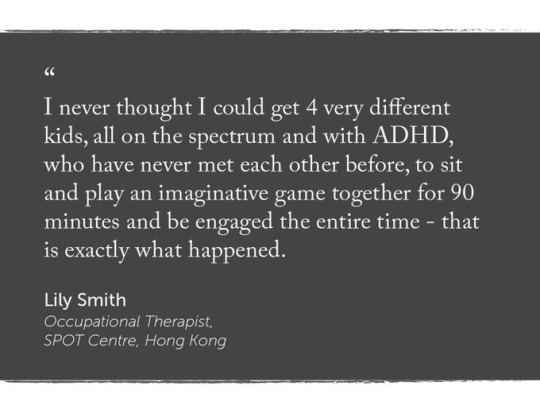


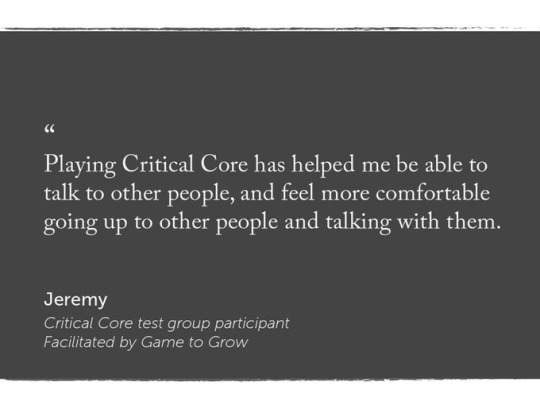
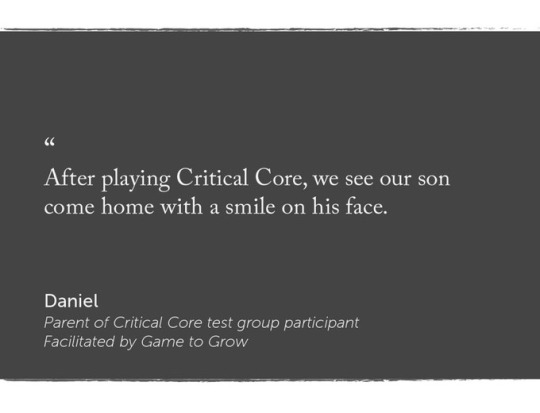


Game to Grow - Adam Davis (MA Ed) and Adam Johns (LMFT)
Critical Core is brought to you by Game to Grow, a 501(c)(3) organization that runs tabletop RPG therapy gaming groups every week. Founders Adam Johns and Adam Davis are distilling 7 years of experience and best practices into the Critical Core project so that the benefits of intentional gaming can be spread to an even wider audience.
Virginia Spielmann (MSOT) - Executive Director of STAR Institute for Sensory Processing Disorder in Denver, Colorado.
Virginia is a British trained Occupational Therapist with more than 20 years experience working in pediatrics. Virginia co-leads the development of the Critical Core Project, defining the system within the established DIR Floortime™ framework of developmental intervention.

mcgarrybowen Greater China - creative agency
The Critical Core project was initiated and co-created by creative agency mcgarrybowen Greater China as part of an ongoing program to provide creative solutions for social good.

ICDL - The Interdisciplinary Council on Development and Learning
A not-for-profit organization dedicated to promoting each person's development to their fullest potential. ICDL was formed over 20 years ago to be the official home of DIR® and DIRFloortime, recognized as the next generation of evidence-based intervention for autism and other developmental challenges.

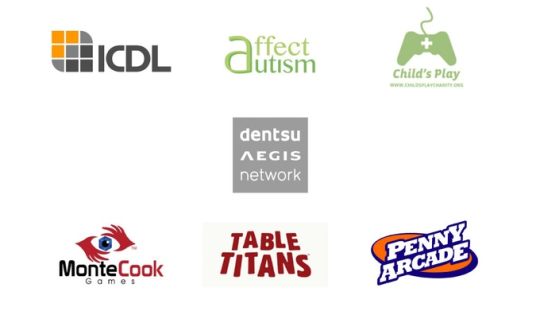

Your passion and support can make Critical Core a reality. Please, pledge now and then get a friend to do the same. Together we can bring the incredible benefits of intentional gaming to those who need it most.

We're committed to getting this right. The majority of our time will be spent improving and refining the Critical Core Starter Set with the feedback from beta testers and testing groups. We also have some final artwork and design work to take care of, and of course there is the physical production. We'll be keeping you informed throughout the process, and probably asking for some help and advice along the way!

Game to Grow is a not-for profit 501(c) company, and our donations are allocated to helping run game groups for kids across the Seattle region. Kickstarter is important for two reasons:
First, you are an amazing community, and if anyone can help spread the word about the incredible benefits of role-playing games, it's you!
Second, there are costs involved in developing and manufacturing Critical Core, so Kickstarter helps us to produce this amazing project!

Perhaps you already have a favorite role-playing game and are wondering how Critical Core can fit into your gaming life. Like many of you, we are avid gamers and have many games we’ve loved for years.
Critical Core can improve the games you’re already playing.
If you’re already playing an established RPG with your kids, your students, or your community, Critical Core can still help you improve your game and boost your outcomes.
Critical Core contains a rule system, designed to be easily accessible to a neuro-diverse population as well as new facilitators, but that’s not all! If you are already established using a game that you enjoy and find effective, you’ll be able to use the other components of Critical Core that are designed to support a game facilitator in helping their players learn and grow.
Critical Core contains a unique module design where in-game scenarios are targeted to real-world development outcomes. This can be translated to most established role-playing games. Additionally, the Critical Core kit includes a facilitator’s guide which contains the learnings of the past seven years of facilitating role-playing games for social growth.
Do I need prior experience with role-playing games to run Critical Core? No. Critical Core is a 'rules-light' tabletop RPG, and the instructions will be designed to help brand new Game Masters quickly learn how to facilitate games that are enriching and fun. We are also planning to release video guides and tutorials to help you out!
I'm already playing tabletop RPGs with my kids!
Awesome! You already know the amazing benefits we're talking about. You also know from experience, that tabletop RPGs can be easy to pick up and play, but learning how to be a great Game Master can be challenging, especially for new players.
Why not use an established role-playing game platform?
Critical Core's rule set is adapted from D&D's 5th Edition Open SRD. We have taken out some of the complexity for new players and Game Masters. Think of Critical Core as an entry-level platform: easier for parents, schools, and clinics to pick up and play.
Are you trying to replace my favorite game?
No way! We see Critical Core as a stepping stone to the wide world of RPG gaming. Actually, we hope that as kids grow familiar and comfortable with the system, they can move on to your favorite platform. If you're already using some of the great games out there, then more power to you!
So how is Critical Core different?
We have applied our experience and best practices to help children (and caregivers) have the most effective and fun experience possible.
Meticulously designed adventure content to help empower kids with social and problem-solving challenges.
Game encounters, guidebooks, mechanics heavily influenced by established developmental frameworks (DIR/Floortime).
Rules have been adapted to be easier for new players and Game Masters to pick up.
Adventures divided into 'one-shot' chapters that can be completed in 90 minutes.
Goldilocks Content' - not too complex/scary and not too easy/cartoony. Just right.
I've been GM'ing for years, what's in this for me?
For starters, you'll be able to pick up the Critical Core system in minutes. We have had inquiries from organizations from across the globe who want to start using Critical Core. You could be a great mentor or GM partner for Critical Core games. Please contact us for more info on how you can help!
Kickstarter campaign ends: Fri, April 26 2019 8:00 AM BST
Website: Game to Grow
8K notes
·
View notes
Photo
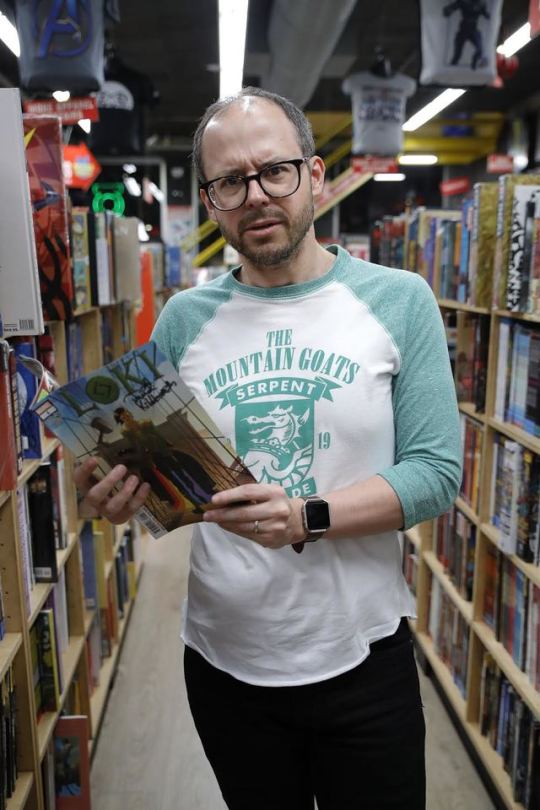
Writer Spotlight: Daniel Kibblesmith
Daniel Kibblesmith is an Emmy-nominated writer for The Late Show With Stephen Colbert and has written comics for Marvel and D.C., including Marvel’s Loki (2019) and Black Panther Vs. Deadpool (2018). He co-wrote the humorous How To Win At Everything (2013), and is also the author of the picture books Santa’s Husband (2017) and Princess Dinosaur (2020). He was one of the founding editors of ClickHole.com, and his comedic writing can be seen in places like The New Yorker, McSweeney’s, and APM’s Marketplace. He works and lives in New York with his favorite author, Jennifer Wright.
What are your inspirations for Loki?
Loki is ever inspired by himself (or herself, or themselves), and that was how it worked for me, too. I was a big fan of Loki as a villain in the MCU, but I hadn’t read a ton of Thor-related comics until I got the gig. The exception was the Journey Into Mystery series by Kieron Gillen and a whole roster of great artists who—alongside Tom Hiddleston's MCU appearances—really set the mold for the modern take on the character. So I re-read that, and from there I expanded outward into past and future, and read the tremendous Agent Of Asgard comics written by Al Ewing, Lee Garbett (and other artists), as well as going back to early 60's Loki appearances orchestrated by his own creator gods: Jack Kirby, Stan Lee, and Larry Lieber.
Aside from comic-related research, one of my editors, Wil Moss, recommended Neil Gaiman’s Norse Mythology, which was incredibly fun, concise, and helpful in giving me a more rounded view of Loki’s history and personality. I’m a big Sandman fan as well, so it was inspiring to stand at the nexus of Kirby’s influence on Gaiman, and mythology’s impact on both of them, and to see their impact on me, first as a reader, and then as a writer, as I set out to place these mythological figures in an approximation of our actual world.
What aspects of yourself do you see or put into the characters you write?
Loki’s defining trait, especially in the original myths, is that he is both the creator and the solver of the problem. Because no one else is clever enough to get him out of the mess he started, he’s barely ever fully exiled from their society. As a former “problem” student, whatever that means, the aspect of Loki I relate to the most—and I think a lot of people do—is the idea that you can mean well, try your best, and still get punished for it.
Authority figures love to reward cleverness if it comes with obedience. I tell a story in the introduction letter to Loki #1 about getting detention for pointing out, during an assembly, that two teachers were inexplicably wearing the same clothing. I obviously didn't break any rules but the people who make the rules found me to be inconvenient and disruptive, so I got punished.
When I hear the phrase, “too smart for your own good,” I think of kids like that who don’t even know they’re about to be labelled as “bad”, which can alter their entire future and identity—for something that, in any adult circumstance, would be seen as attentiveness, or creativity, or intelligence, or just relatively harmless humor. Loki is a kid who got treated this way for a thousand years, so, of course, he became a villain.
The story we’re telling now is about coming back from that—healing, forgiveness, and the responsibility that comes with an ever-racing, ever-curious brain, the default setting of which is casual mayhem. Loki’s superpower is one that real people actually have to live with and manage: “I just noticed a vulnerability in our world. What would happen if I acted on it?”
You’ve written for television, the internet, for magazines, and have authored books and comic books — how does the writing process vary for these different forms? Is there one you prefer?
I often compare it to playing different video games because the needs and reflexes are different. Writing satire about the news is faster-paced, and comes with its own formulas, just like character-based narrative. Writing a monologue script based on a news event is very reactive, like Mario Kart: foot on the gas, hit the important stuff, miss the stuff that will slow you down. Writing fiction can be a lot more exploratory, like Zelda: I walked around for two hours today but I found a really important acorn, that I really needed for the stuff I'll do next. Writing comics can be very nose-to-the-grindstone, but for me, breaking story is often incidental and happens at the gym, or before sleep, or in the shower. The major architecture of my narrative writing exists as fragments on my phone and in pocket notebooks, born out of little sparks of inspiration. The heavy lifting happens in fleshing them out and editing them together into something cohesive.
If you could live in the universe of any book or comic book, which one would you pick and why?
I’m not the biggest Harry Potter fan—I've read five of them, I think. But I would choose to live in the Harry Potter universe because as near as I can tell, it’s just our current universe but with far superior candy.
If you could have a conversation with anyone, real or fictional, who would it be and what would you talk about?
Probably Gumby. He seems chill.
What advice would you offer to your fourteen-year-old self?
Fourteen is honestly too young for most actionable advice from successful adults, and you’re not really in charge of what you’re going to do that day, anyhow. I usually tell college-aged writers to finish entire writing samples, that ideas and potential are far less attractive to people who can hire you than finished scripts or stories are. But I can’t imagine my career taking off based on the screenplay I would've finished at fourteen. So my advice would be to start drinking coffee and working out because both of those things are going to make you feel better in a world of things that are trying to make you feel terrible—including, in some cases, young adults roughly your age and twice your size with whom you are trapped, by the hundreds, in a massive brick building, in which they are often inexplicably literally trying to maim you. In case anyone was wondering where comic and comedy writers—and trickster gods—come from.
Thanks so much, Daniel! Follow @kibblesmith! If you’re lucky enough to be attending New York Comic Con in October, Daniel will be signing in Artist Alley at Booth A-28.
Photo: Nick (IG: @goldenparachutephotography) for Midtown Comics.
349 notes
·
View notes
Text
Blog Post #1 Examining Youth Culture
I loved watching the show Euphoria the best out of all of the assigned movies and shows. It’s been something I’ve been wanting to watch for a while so I thought this was the perfect opportunity to binge the whole season. The movies and shows assigned to watch were, Euphoria, The Breakfast Club, Mean Girls, Mid-90’s and KIDS. I know... That’s so fetch, right? Throughout each film, there were tons of astounding characters, some being well known throughout society. Perhaps Regina George rings a bell to anyone? However, despite all of the fantastic characters in each work, I feel as if I identify with Rue from the show Euphoria the most. I feel the most connected to Rue because she is a young teenage girl who has to deal with mental health issues but also the fact that she has fluid sexuality. She likes men, women and just gravitates towards anyone she feels connected to. I'm part of the LGBTQ+ community so the amount of representation I felt in the show was slightly overwhelming. Especially since many older shows and films lack representation so when something arises with more LGBTQ+ representation it makes me happy. I also know how it feels to be in Rue’s shoes, especially with her relationship with Jules in the show. The whole season is a rollercoaster of Rue and Jule’s relationship and as the season progresses Rue finally takes the leap of faith and kisses Jules. **Sorry if I spoiled it for anyone** I’ve been in situations with past relationships where I liked a girl for so long but never could make the move and it was interesting to see Rue’s confidence build and I think her becoming sober helped with that aspect. An article titled The Unicorn Scale written by bi.org it discusses the different sexualities and identities of the characters in the show. It states that Rue, “Rue’s sexuality seems to be unexplored but fluid, she is clearly interested in men, women, and everyone else. Rue’s bisexuality is not shown as the cause or causing her drug addiction, it is simply another facet of who she is. Her nerves seem limited to the normal anxieties we feel for our first love” (The Unicorn Scale: Euphoria) Rue’s character also goes through many ups and downs throughout the season. She struggles with drug addiction and staying sober. She lost her Dad to cancer and had to have her younger sister find her overdosed in her room. Three common themes I’ve noticed in each of these films and shows are one, family dynamic/struggles, sex, and, coming of age moment.
youtube
The first theme, family dynamic/struggles is relatable to youth culture because growing up as a young adult or teenager can bring a lot of family issues. For example, in the movie MID90’S the main character Stevie is physically abused by his brother Ian. In one scene, Ian barges through Stevie's room in the middle of the night and punches him repeatedly. There is also no father in the picture and his mother is a single mom. So this could contribute to some of the reasons why Ian abuses Stevie. He could be taking out his anger in the only way he knows how and that’s with violence. I feel that people, especially young men struggle with dealing with their emotions and healthily expressing them. This theme also relates to me because I struggle with family issues and throughout the years it has taken a toll on my mental health. We also see in the movie KIDS the family dynamic and how it affects the main character, Telly. In one scene they show Telly’s mom taking care of the baby in their small city apartment. Telly asks for money and the mom says she doesn’t have any to give. Telly goes out and says he will be back later. The mom is so focused on the baby that she is not paying close attention to her son and what he is doing. This negatively affects Telly because he gets into the wrong group of people. This happens often without young people, it's a form of negligence that can lead people down the wrong path.
Another example is the dynamic between Nate Jacob's and his father in the show Euphoria. From a young age, Nate has been intimidated and scared by his father. In one scene, Nate’s father comes into his room and tells him how he played in the football game. Nate and his father get into a physical altercation and Nate starts to beat his head repeatedly against the floor. The second theme of sex is a big issue in most of these films and tv shows. When viewing and studying youth culture I’ve noticed how sex is a big part of a young person's life. Especially when I was in high school, sex was a majority of what people were talking about and it always mattered who was hooking up with who. I didn’t necessarily care for it and I had my experiences later in my life and at the end of the day, I don’t think it’s worth the hype and stigma around it. There are more things to do and talk about than sex. In the movie KIDS for example the main discussion of the film was sex and how the main character Telly wanted to have sex with virgins because they were seen as pure and innocent and he had the power to take that away from them. In the movie MID90s, the character Stevie has his first sexual experience and it was very real for many young people. In the scene, he starts to shake and get nervous, in an interview conducted and written by Slate Culture, asks Jonah Hill, the director of the Mid90s film, about the scene. Jonah states, “To me, showing it as harsh and as honest as it was back then was the point. You know? The point that this kid is terrified and shaking during his first sexual experience. And we get to see that as the audience. And he only gets happy and excited once he realizes it’s his currency to raise up through the group And that’s a fucked-up lesson that a lot of people now are having to unlearn from this time period And to me, I just wanted to show how that was and let the audience see that for what it is” (Bloomer) When you have your first sexual experience it can be a very nerve-wracking moment and in youth culture, the sexual experience is different for many and I believe it's split between boys and girls. As portrayed in these films for the young men, when they have sex it’s a powerful experience that boosts their confidence when they tell the group of guys they are associated with. For girls, it’s a moment that is more kept to themselves and cherished in a sense.
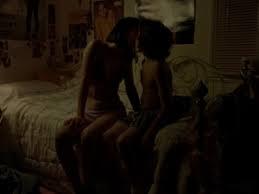
Being that I identify as a lesbian my experience doesn’t follow the heterosexual story so it’s interesting to me to see how the experience can be for heterosexual people. Lastly the last theme of a coming of age moment. I feel that when you are a young teen there is always this hope that you will have this coming of age moment like in the videos. I feel that Hollywood does a good job of exaggerating what a coming of age moment is for a teen. The film that is a clear example of a coming of age moment is the iconic Breakfast Club. According to the source, Movies, “The Breakfast Club (1985) is perhaps one of the best examples of a classic ‘coming of age’ plot. The film details the lives of five high schoolers stuck in a weekend detention together, only to have the misfit gang bond together despite their differences. This cast of characters are delineated by the conventional roles they fill: the Outcast, the Princess, the Jock, the Basket Case, and the Brain” (Holderbaum) The Breakfast Club shows how highschoolers defeated the stigmas and social scale of highschool. This connects to me a lot because high school was a very difficult time for me. Just like the movie we watched Mean Girls, I was at the bottom of the social ladder because I was different from a lot of people. Being a lesbian, out in highschool isn’t fun especially when you have guys who say “I can change that”. Despite the exaggeration by Hollywood with this big coming of age moment, I believe that my coming of age moment just like the Breakfast club was defeated the social ladder and being a confident, strong, lesbian at the end of my high school career.
The soundtrack of a film, TV series impacts the narrative of a story because it can uplift any emotion or feeling a character is feeling or trying to portray. The soundtrack can make or break a film/show. The soundtrack is a narrative of the story and can bring chills down your spine when watching a film. If a soundtrack is not done well the movie is not as impactive. In the movie the Breakfast club mostly everyone knows the famous song Don’t You and the iconic last scene. If it wasn’t for that song I believe the movie would not have been as famous. The playlist I made called Adolescent experience is a list of 10 songs that define me and myself growing up as a young teen trying to figure herself out. The first song on my playlist is, Electric Feel by MGMT, this song was one of the first songs that I listened to when I got my first iPod. The feeling it gave me felt like I was in an indie film when I would listen to it on long car rides. The second song on my playlist is What You Know by the Two Door Cinema Club. This song helped me with coping with my feeling of being lonely and feeling like I had no one to connect with, especially with being a young teen still stuck in the closet. The third song on my playlist is Little Secrets by Passion Pit. The band Passion Pit was one of the first bands I ever discovered and fell in love with. The fourth song I have in my playlist is 1901 by Phoenix. Anytime I listen to this song it gives me this feeling that I can accomplish anything. The fourth song is All For Us from the show Euphoria and sung by Zendaya and Labrinth. I love this song because it reminds me of the love I carry to many people in my life and how it can be tiring doing things for love all the time. The next song, Work by Rihanna is one of my favorite songs to dance to and it reminds me of a great memory of my middle school best friend Nina and me. The seventh song is Butterflies by Kacey Musgraves, this song is very meaningful to me because it's me and my girlfriend's song and it’s a reminder of the growth I have made within myself and my love life. The eighth song is Cruise by Florida Georgia Line, this was the first country band I started listening to when I was younger and the band reminds me of a very traumatic experience in my life. The ninth song is Man I Feel Like A Woman by Shania Twain. This song strikes a happy memory in my childhood because when all of my siblings were little and would be in my mom's suburban driving down the road we would sing this with her. The last song on my playlist is The Less I Know The Better by Tame Impala. This song just gives me an overall feeling of happiness and it was a song I listened to a lot when I was in a really good spot mentally.

2 notes
·
View notes